The Night Train (Uppsala To Keb)
Ode To Kebe
The sun,
everpresent.
The horizon: unfaltering.
The hills, encroach,
all sides
imposing
The foot seeks its rhythm.
The leg follows suit.
The body, adjustment.
The body, electric.
Sore ankle and boot.
Skin
Wool
Sweat.
Sweet, sweet soul stirring sounds
Of rubbing heel & busted blister.
Danish accents and
Drunken descents,
Deer, Does and mounds of rock.
Wonder the impression
Wanders the mind
Wonder of endurance.
Wanderer of time.
Wonder of space
Mind on the Maker,
Maker of Minds.
This is a beginning,
True.
Vistas
for the very first time.
Open passport
Enticed…
as only the physical
entices
patternly time.
The moon
swallowed whole.
Mid day, mid way, midgard.
Old norse: the new backyard…
Good Morning, Midnight, indeed.
Intro:
In 1885, scientists in Uppsala created STF (Swedish Tourist Association) in order to better access and maintain paths in the Swedish mountains. This same STF exists and maintains the trails today.
Kungsleden, King’s Road to the english speaker, is one such path and is approximately 440 km long. In its entirety, The King’s Road consists of marked and unmarked roads between the cities of Abisko and Vakkotavare. Counting the south, it runs all the way down to Hemavan. Start early enough on the trail or walk long enough and the path will bring you both under and over the treeline.
I’d heard about The King’s Road when I first moved to Sweden. The views were supposedly amazing and the hike, long but do-able, and there it sat, idly at the back of my mind, as a thing every ‘Swede’ should do and then Covid hit.
I was talking to a friend about abrupt changes in summer plans when we decided the time might be right to try and get it crossed off the list. We were stuck in Sweden for the summer so why not?
When planning, we decided we would walk from South to North (Nikkaluokta to Abisko) over the course of 9 days (including train travel). We chose this direction in order to have fresher legs for the hike up Kebnekaise. We hope this will give us a greater understanding of the weather and allow us to summit ‘Kebe’ in clear skies.
It’s only when the trip gets underway that we find out people usually plan their week-long trips from the North. However, these same hikers all too often arrive at the base of the mountain on the last day of their scheduled trip and, left without alternative, climb Kebnekaise in rainy or overcast weather.
While the journey through the valley is certainly important and, in essence, these travellers do invariably make it to their ‘destination’, they often do so at the cost of missing the view from its summit. On a clear day, it is a view which supposedly consists of 33% of Sweden…
To get there, we book an SJ train a little over a month in advance. According to the website, the train ride from Uppsala to Kiruna would run roughly 13 hours and 27 minutes without any delays but we have a few. The initial plan s to take the Night train, that way we leave early in the afternoon and start hiking on arrival first thing in the morning the following day.
We book a three bed berth and find ourselves sharing the space with a long distance runner. A long distance runner who happens to be a friend of Pontus’s friend.
Though we are left alone for long periods of time, playing cards, chess and intermittently chiseling a tighter breakdown of the trip, our conversations are periodically interrupted by this third person and we learn, early on, in shock, that this man plans to run an even longer distance than we plan on hiking.
He says he will run the entire Northern trail and will do so with no more than a small backpack filled with protein bars and less than a liter of packed water.
We stare,
mouth ajar.
He pulls out a small rolled up plastic tube from his bag and points out that it is attached to a Solomon filter (which we both want) and what little gear (he will be staying in cabins) he has brought for the trip.
By the time we get off the train, we’ve accepted the itinerary. Our day plan is as follows: Each day we stop at or near a STF cabin, starting a Singi, we hope to move to Sälka, then Tjäktja, Alesjaure, Abiskojaure and finally Abisko. The morning of Day 2 we plan to make the hike up Kebnekaise. For those who don’t know, Kebnekaise is the tallest mountain in Sweden, at 2,097 metres (6,880 ft).
As many of you are certainly aware, Sweden’s approach to Covid differed and continues to differ greatly from other countries. Fair warning, you won’t be seeing us wear masks because it wasn’t obligatory and we knew we wouldn’t be in close proximity to anyone during the trip. That does not mean we are anti-mask. It is simply the way it works/worked here…
After waiting for the bus to pick us up from the train station we finally set foot at the start of the trail. We are excited and unsure whether to rush into the trip or try and keep a steady pace.
Neither of us have been on long hikes before and we aren’t sure what to expect. We have, however, accepted an unofficial mantra.
Slow and Steady.
Right before the trip my friend Anna tells me her sister and her sister’s boyfriend used to be guides and they led hikes up Kebnekaise. She says the worst mistake newcomers make is rushing forward.
‘Take a break before you are exhausted’.
‘Break often and remember the sun doesn’t set so there’s no rush. Keep it steady. Find a rhythm’.
Anna tells me about her first hike, walking slowly with a guide. Throughout the day, she pointed out to her guide all the groups that were passing them by. How come they were going so fast and they were going so slow. The guide’s response: ‘No worries, we’ll be seeing them in the near future. Sitting down. Exhausted’.
Sure enough, she says, they did and that day, her group is the only one to summit the mountain. I digress…
‘Energy to spare’
We are walking and I realise there’s a rhythm that sets into your thought process when you walk long distances of time. It’s not just the steps you take. It’s the one our mind starts to take now that it doesn’t have to process the sheer quantity of information modern society thrusts upon us. The mind isn’t absentmindedly trying to figure out what it should do next. It knows and it’s simple. Take another step.
The lengths of time, which in modern society, so often consists of mere fragments, chunks of hours, two or three at the most, be it watching a movie or playing a sport, no longer apply in these long hikes. There is no going back. There is only going forward and all other options have been removed. You cannot pause a journey into the wild for a random and unplanned amount of time. There is a finite amount of food and little means of restoring it. There’s no consideration as to how best to move forward, be it in comfort or speed, there are no longboards, bikes, buses, cars or trains for that matter on the trail.There is only walking and there will only be walking for hours more to come…Hours without internet or phone connection, without video or digitized visual information. Hours without media as a whole.
Yes, there will be a time to rest or sit or lay, but all of this is only a delay, time taken away from the necessary, from the: left right left, of the next 7 days.
Day 1
We walk from Singi to Kebnekaise station. There are trees and flies and sometimes people. Mosquitos are sparse. The sun is out, it is bright and very quickly we are aware of this new movement of time. We discuss it but devote little energy to processing it. It bears little to no real influence on, what we realize, consists of the more important things at hand: food, water and the proper weight distribution of our massive backpacks.
We eat when hungry. We rest, when needed, and the light, ever present, ever consistent, of cloned quality, never fails. It is high and central and leans ever so slightly to our right or left as we move forward, weaving in and out of the trail.
There are few trees around. We are on a well worn path and shade is hard to come by. The sound is whatever rubs as we move. The wind exists as background noise much the same as its does in a Video Game or low budget movie, meaning, you are aware of it only when trying not to be. It helps dull the noise of the boots and straps, but only when consciously necessary. This, usually done, quite simply out of a desire to break up the monotony of sound.
We tighten or loosen our straps hoping to find that sweet spot where everything sits and glides as it should, when it should. We soon realize tricks, spotting them on other hikers or find them out for ourselves as we move along.
‘Keep your water bottle hooked to the side of your bag’.
‘Make sure the weight sits on your lower back’.
‘Use both hands, cross armed, to sling the bag onto your back and avoid extra strain’.
‘Use two pairs of socks’.
‘Avoid chafing’.
‘Keep things clean and dry, etc’.
The walk is long. We find a stream and make a fire. We boil water. This is the first time we use water from the ‘field’. We figure it should be ok once it’s boiled. The food, plain old noodles, is delicious given the heat and hunger at hand. We clean our things. I already regret not bringing more bags and better bags to keep the dirty utensils away from the other food. Lesson learnt: avoid Ikea plastics….
We move forward. We don’t know what to expect and we’re both surprised when we see a boat bringing in travellers. It turns out there’s a shortcut for those with money to spare or no energy to move.
We keep moving. Eventually we make it to a large waterfall, and there is a sign that says the mountain is nearby.
It would be great to camp by the waterfall. I am tired and this spot is beautiful, but we want to be as close as possible to the mountain and we decide it is best to get closer to its base, so we suck it up and move forward.
View From the Bridge Over The Waterfall
Tents start to pop up here and there as soon we enter a small clearing within the forest. There are squared plots of land, some flat though not as worked over or cleaned up as might be expected. This is a transitional forest. There are no ‘free’ plots and so we drag our feet and scan our surroundings until we see cabins through the clearing.
Our bags seem to get heavier with every step. Our mouths are dry and we hope cold, clean water or beer is at hand. This is Sweden after all and the cabin is sure to be a proper base camp with electricity, big windows and a well stocked supply store.
We enter. There is not room. We discover we have to walk forward past the cabin we’ve just entered or head back in the direction we came. It’s busy at this time of year and plenty of people unable to leave the country have recently invested in a tent and camping gear. Better the devil you know.
We move slowly and achingly make our way back to the outskirts of the little forest. Rather than head back to the waterfall, out of exhaustion, we settle in the field. This is one of the regrets of this trip. We set up our tents. Say good night and pass out.
2.
The next morning a helicopter wakes us up. We start later than expected but both of us needed the rest. Pontus suggests we keep the tents and most of our things here. I’m worried about thieves but also I realize there are no cars and they’d have to carry all that extra weight on their back just like we did if they wanted to steal anything.
We leave them behind. It’s the right thing to do as it removes countless kilograms off our back. We pack our water bottle and some small amounts of food. I have a canvas bag and put some of the food in (canned salmon, trail mix, a protein bar) and awkwardly slide my arms through the slings so that neither one of my shoulders will have to bear its weight one-sided. Pontus hands me some of his food to put in my bag and latches his bottle to his pants.
We start off excited. This is the moment we’ve been waiting and planning for. If everything else falls apart, at least we’ll have climbed the mountain.

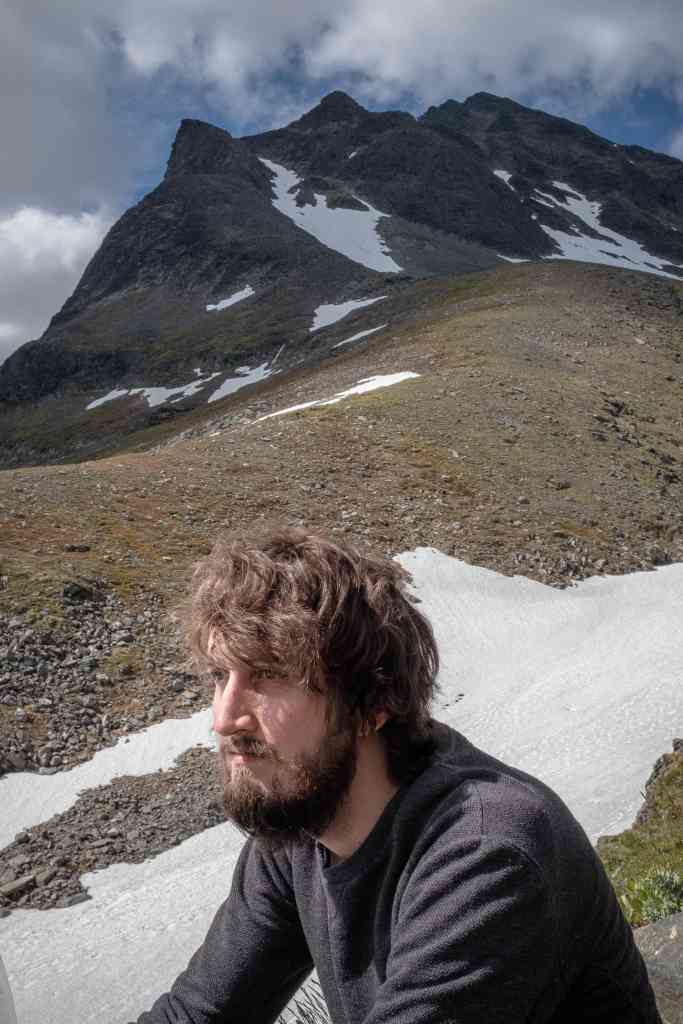
We are much further from the base of the mountain than expected. We talk through countless tents outside the ‘official’ zone, past the base camp and zig zag along a second diaspora of tents in order to finally find the (partially) untamed outdoors. It becomes apparent we aren’t the only ones that planned a hike into the great yonder because of the pandemic.
Within a half hour we are alone. The talk is mostly about the future. About the weather, gear and the joys of fresh spring water. We see some snow but it’s mostly melting and usually consists of grayish chunks. We cross the first big stream and for some reason it is at that moment, at least for me, that it finally feels real. Like a real adventure. The way you imagine it feels when you first hear the stories about knights riding into the wild in order to save damsels in distress or what it must feel like when Sir George journeys into the Forest in The Magic Sword. Yes, it did take us nearly 6 hours to get to the base the previous day but that was essentially a straight line. This is the money shot.
We see the path rise along the side of a mountain and see that it continues onto another one. We assume, wrongly, that this cliff face is Kebnekaise. As we walk we encounter an old man with a bloody scrape on his face. We ask if we are close and he chuckles, he says “You’ve just started”.
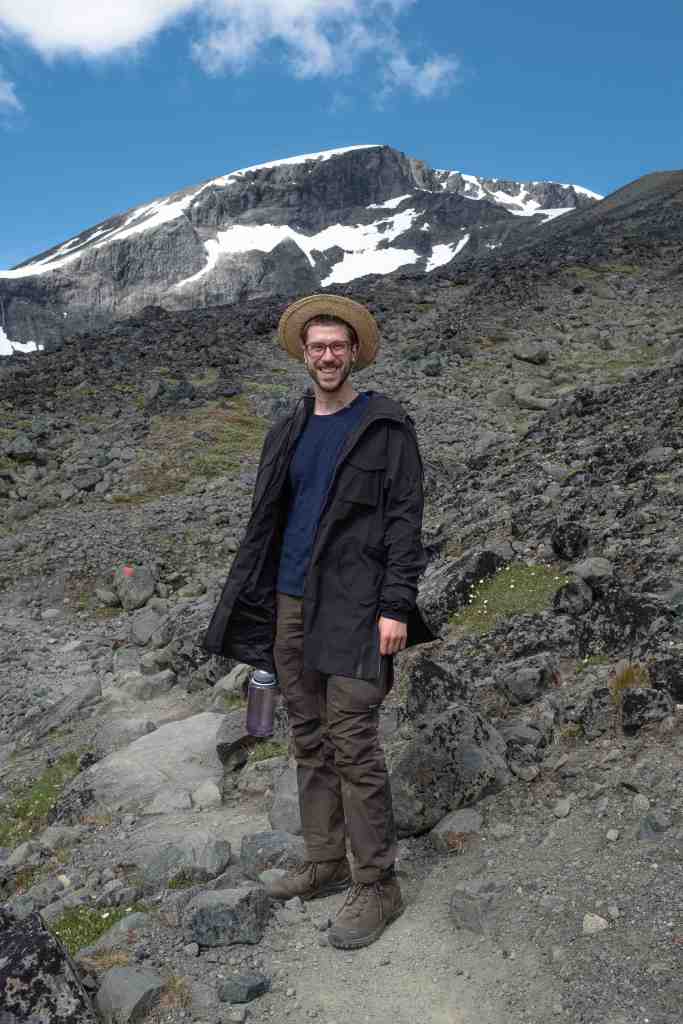

We look at each other a little surprised, thinking he must still be in shock after the fall…
We play 20 questions and talk about apps and music and Blink-182. We discuss the death and the possible rebirth of the pop-punk genre and realize Blink, Sum-41 and Billy Talent have all released new albums relatively recently.
Three young men walk by us. This is the first time we cross paths but it won’t be the last. They are rushing. It is tempting. We want to do the same. One of us says: Slow and Steady. Our adrenaline and testosterone says otherwise, but we stick to the mantra.
We take multiple breaks, mostly to drink water. Pontus walks faster than I do and he often finds a place to sit or lean on for 5 minutes as I catch up. We are astounded by the loud rushing sound of the water. It seems to be coming from the bigger mountain, melting snow, pure, fresh and cold to the taste. Pontus says it might even rival his mother’s fresh water up in Dalarna in the North of Sweden. We fill our bottles and it is delicious, only, I am half way through drinking mine when I find a worm moving in the water.
We move forward and encounter a metal bridge. We are happy to see our STF money is being well spent. Though rickety, it provides a memorable view of the water below. Steps carved out of rock come soon afterwards. These are definitely man made. They are not simply rubbed out by the feet of those thousands who came before us. We later find out they are a relatively new and though mostly covered in snow, they provide a welcome alternative to ice covered rock. We check our footing at every step and make our way to the top. The edge is a drop a few hundred feet in height… Slow and Steady.
We meet more people. Some we pass. Some are going in the other direction. We start to recognise faces. There is Repetition. There is a young man with two walking sticks along with two women. He is rushing forward. We look at each other and shake our heads. We assume he won’t make it. Later on, we prove correct.
We pass the 3 young men from earlier and decide to take a rest slightly in front of them. We see they have a little bit of food and hey seem to pack up as we sit down. They do so in a rush, as if our presence somehow means they’re off track or off schedule.
We eat trail mix. It is the first of many bags. We’ve each made our own which consist to some varying degree, of peanuts, oats, cashews, raisins and almonds. It is dry and my bags, cheap Ikea ones, have already started to tear. There are bits of loose, sand-like clumps covering nearly everything in the canvas bag, including the book Walden by Thoreau, which I naively thought I’d have the time and energy to read on our breaks.
We get up as the young man and two women near us. I guess we aren’t that different from the boys, I am unsure if the timing is intentional.
It gets quiet as we walk. We both realize this might be more tiring and, generally harder to do, than expected. We are nearing the top of the mountain. There are, in fact, small markers to help guide us to the top but these aren’t always the easy spot.
We finally make it to the top of the mountain. It is the same one we saw at the start of the hike. We are exhausted and surrounded by strange inukshuks. A Swedish version of those I am used to seeing beside highways in Canada. We look around and see several people descending on the other side. Pontus asks in swedish: ‘Vart ska du ?’. It turns out we’re only half way. We look down. There is a steep drop, characterized by chunks of rock of various sizes, shapes and spaces. At the base there is a large valley filled with snow and a snowman. Footprints are visible to and from the snowman. A single set. Someone’s built it recently and we are shocked they found the energy and time to do so. On the other side of the valley there is another path that seems to more aggressively cut a diagonal line from its base to the top of the mountain. We look at each other doubtful but ever keen on making it to the end.
We start walking. It’s here we find out Pontus is better at descending mountains while I am quicker climbing up. We walk and talk and try to figure out if it has something to do with the length of our legs, or arms or the type of shoes we are wearing. Both of us acutely aware that there’s a definite change of pace depending on whether we are ascending or descending a slope.
At the base we take a small rest. We believe, incorrectly, that we are half-way there. I take a few photos and we keep walking. We see a helicopter fly above us and wonder if someone is hurt. We continue walking, mostly silently until we see someone with a man-bun and a massive green backpack catching up to us. We are stunned. The weight of that bag must be making the hike unbearable. Soon afterwards we sit down to drink a little more water and spot the three boys. They pack up and start walking almost as soon as we sit down.
The man with the man-bun has, what looks like, a full 75L hiking bag. He seems to be traipsing around, zig zagging across the path rather than following it. He, very much, in my humble opinion, fulfils the ‘papa betala’ Swedish look I’ve heard so much about since moving here.
He walks by quietly keeping with Swedish reserve.
We pack up and feel a rush of energy, seeing a small cabin, we think maybe they have beer for sale. We quickly find out it’s locked, it’s empty and probably a weather shelter of some sort . No 3.5% Heinekens for us. We look up and see there’s still a ways to go. We talk about how good it will feel to make it up to the top. Whether or not the weather will hold and whether or not we’ll have the top to ourselves.
We make it the top of this second mountain and find ourselves on a very flat, long plain. I am exhausted and ask if we can eat. Pontus wants to move on but I remind him we haven’t eaten in hours. He sits down beside me. I rip open the tab on my canned salmon and, when finished, start drinking the oil. I feel myself behaving aggressively towards this canned goodness but can’t stop myself. I know I have very little food left in the bag and I need to have the energy to not only make it to the top but make it back down afterwards.
We laugh a little bit about how hungry we are and Pontus mentions for the first, but not last time, that he will never eat trail mix after this trip.

We pack up, making sure not to leave anything behind and start walking. I am tired and Pontus moves ahead. Though it’s generally clean with only a few rocks, the true summit is covered in snow as is its base for several meters. Pontus gets a boost of energy and kind of skips towards the base. I walk slowly, my knee starting to hurt and make it there a few minutes after him.
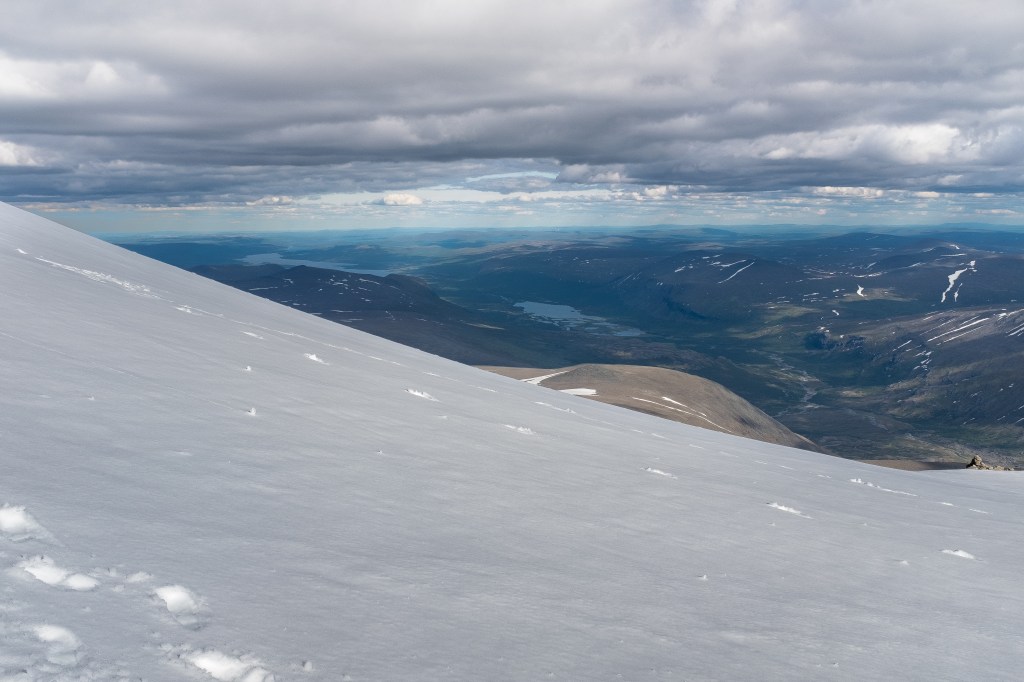





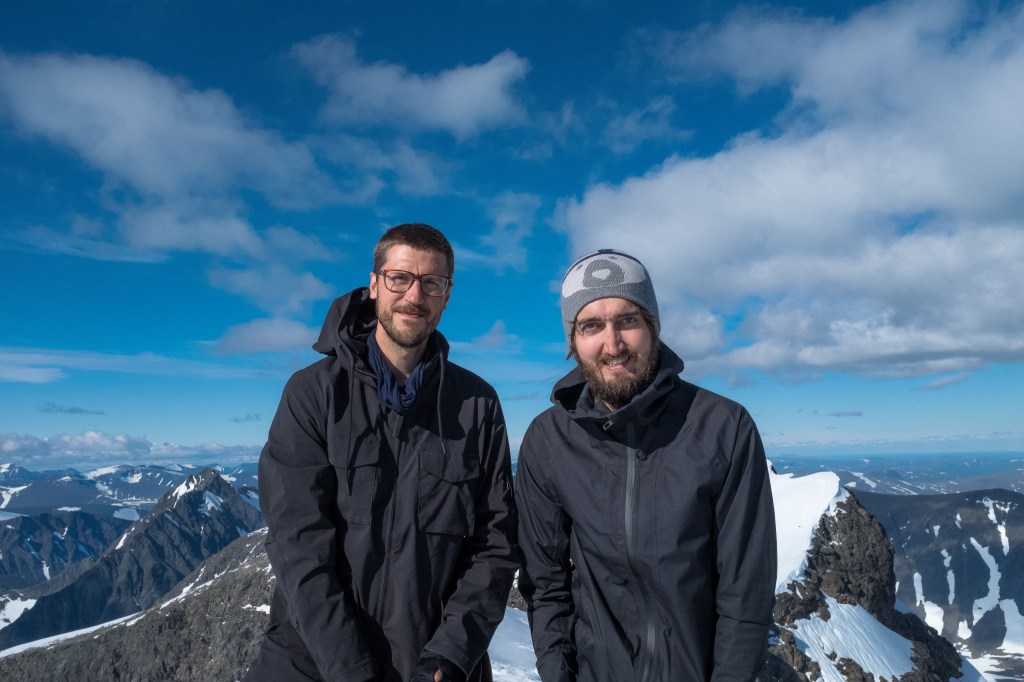
He is sitting enjoying the view. It is a truly beautiful day and the sky is clear. We can see Norway and all the fields and meadows we’ve walked by to get here. The people beside us, a group of four or five are drinking beer. One of them is on the phone with his girlfriend. It kind of spoils the moment for me. We laugh about it and talk about how ‘only in Sweden’ could you be in the middle of nature, kilometres away from ‘civilization’ and still get a phone signal.

We rest a little while and shakily stand up to get a better view. It is scary. Really, truly frightening. It is much more narrow than either of us thought it would be. It is very cold and the wind is blowing. It is nice to be on top but, with the other people around, we don’t have that much space to safely wander or move about. We look around a little bit.
We look at each other and then look around some more. We talk about having ‘made it’, having achieved something ‘kind of big’, and we wordlessly understand we’ll probably never do this again. It was hard, we are sore and we’re only halfway done. Once again, if you’re afraid of heights, the summit is a truly uncomfortable spot. Neither of us really moves from our initial sitting position. We just awkwardly shift our weight to catch a slightly different angle of view. Later on we find out people have slipped off of this peak and died. When I hear this, it makes me feel better about being scared, but not necessarily about being up there.

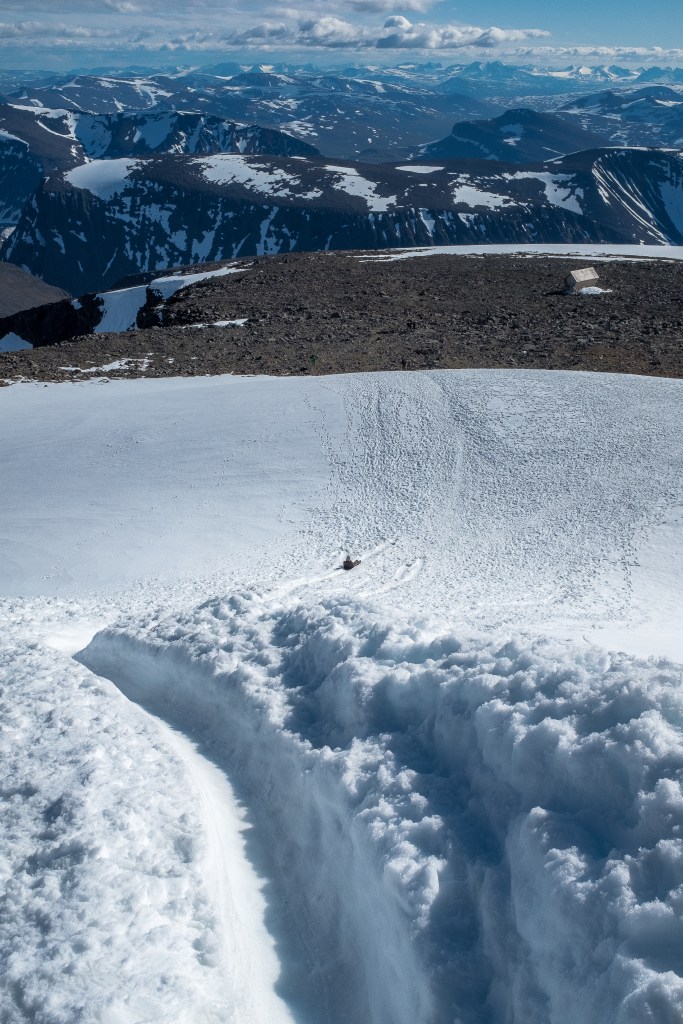

The people that arrived before us start to slide down the peak. I brought a cigarillo and we smoke a little bit, contemplating the long trek back. We have a few moments alone and then we slide down the same path as humans so often do.
At the base, Pontus takes inspiration from his fellow Swedes and calls his sambo (short for ”sammanboende”, it’s a Swedish terms for a person who lives, long term, with their partner, without being married) think of it as common law marriage. He live streams the view from the base with her.
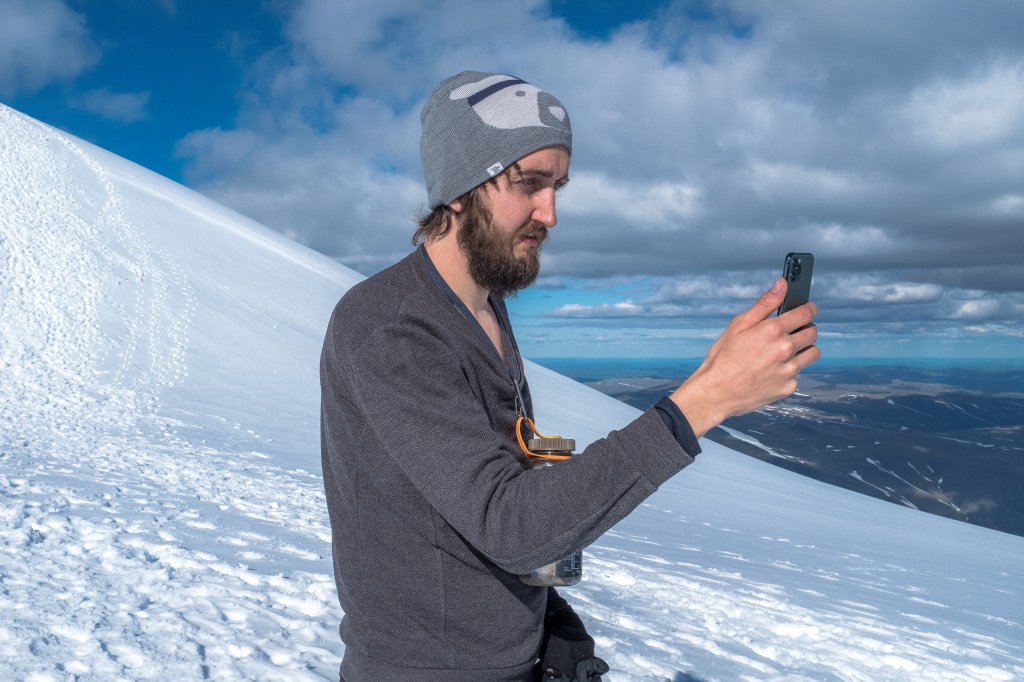
It is exciting, exhilarating and oddly depressing. All we have to look forward to now is an air mattress and a fresh pair of underwear. We decide we’ll slide down the peak one final time and then start the trek back to base camp.

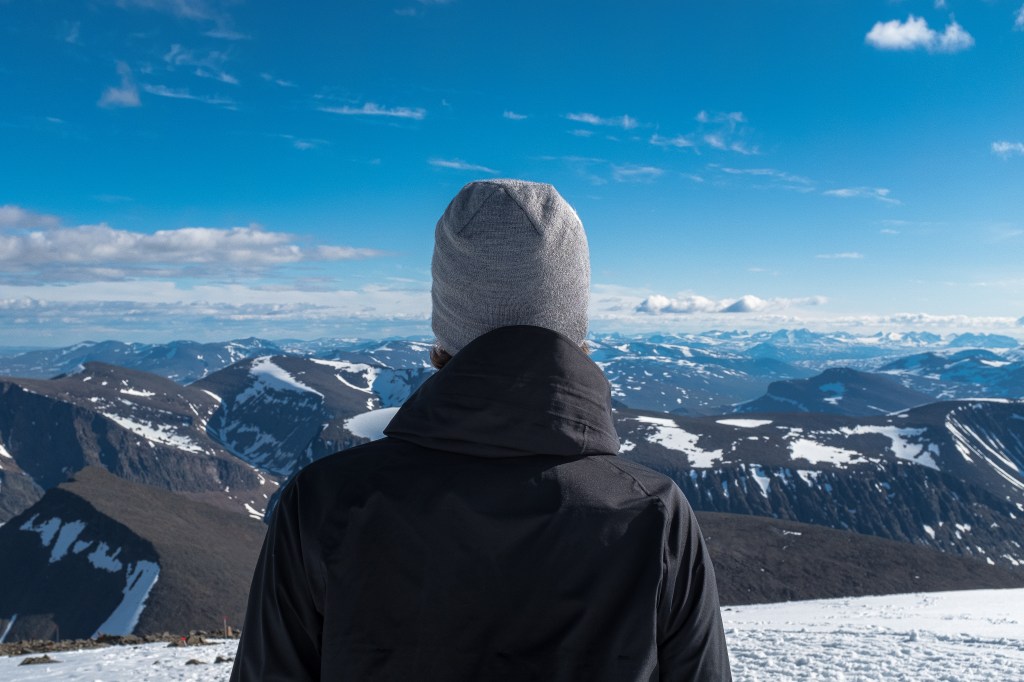

We start walking. An hour later we meet two of the three men that kept packing up their food anytime we neared them. They ask us how much longer to the top. One has a proper John Wayne style accent. I can’t tell if he’s putting us on. We say they have no more than an hour to go, though at their pace it might take longer. We are self-satisfied. We did make it before the young’uns and they tell us they’re not even sure if they’ll bother with taking the time to make it to the top before they head back. We convince them it’s worth the effort and part ways.
We have clean underwear to look forward to after all.
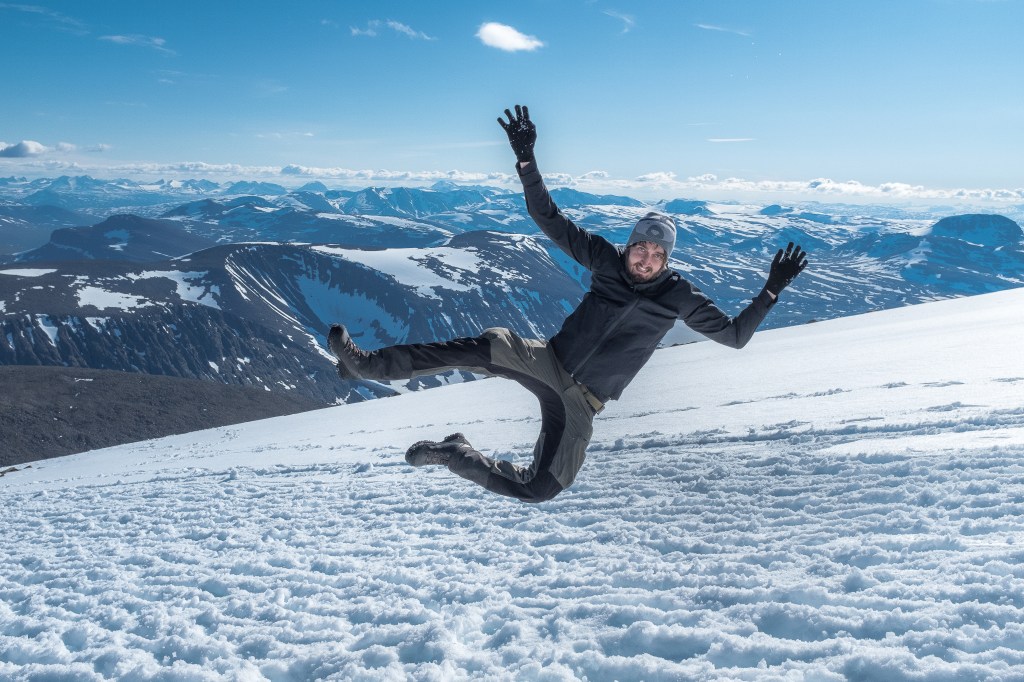
The walk back down the first mountain is a decidedly less enthusiastic affair with earnest bouts of exhilaration. It’s the same rocks with a slightly different view. The energy levels are non-existent. Whatever drive moved us forward, the thought of the peak, of a lifetime accomplishment, of a bucklist item being checked off… All of that is gone, the only thing left is the hoped for comfort of a tent.
We start talking about what time we’ll wake up tomorrow and how long it’ll take to make it back to the tents. We talk about the lack of food we packed and how my straw hat already has holes in it (I added a thin rope strap by piercing two holes into its sides, this wasn’t a great idea)

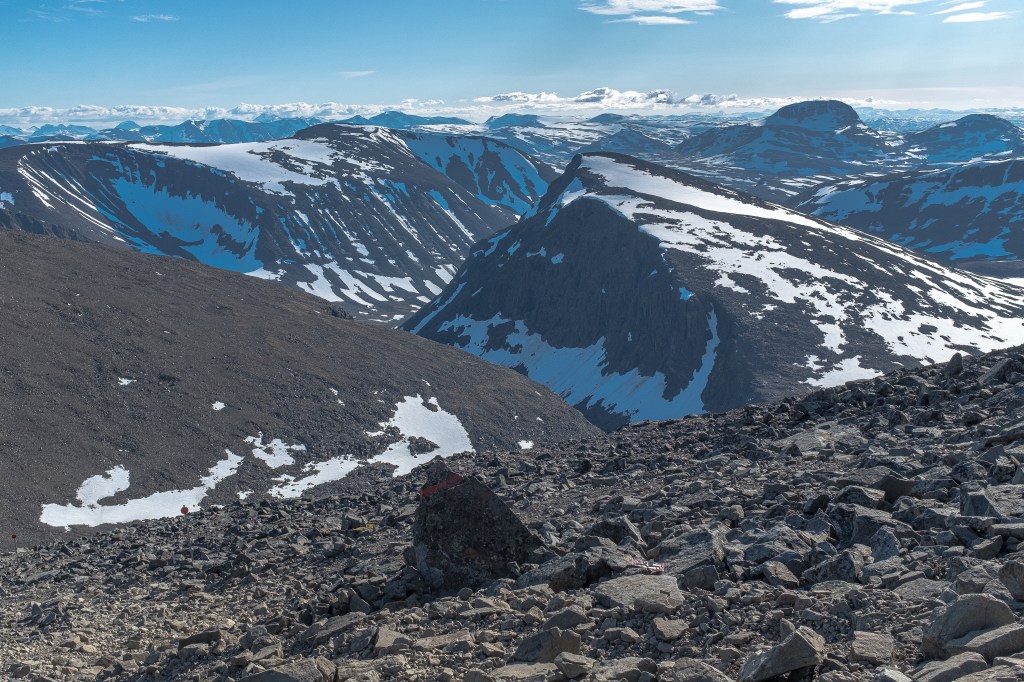
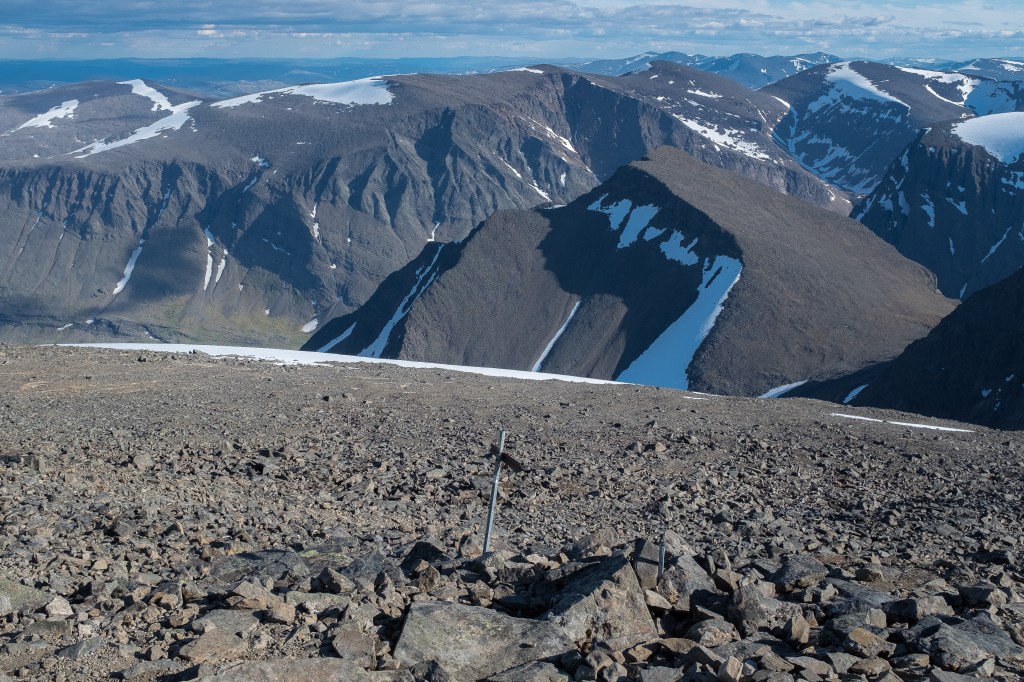

We rest once we make it down the first side. Looking around, we notice someone took the time to destroy the snowman. Who has the energy? The snow is refreshing and tempting to eat, but it is probably a bad idea. I pack my bottle with what looks like clean snow anyway, hoping it melts.

We start the second hill and notice the boys aren’t behind us. We wonder if they made it or if they’ll camp out at the top. We hear a helicopter. We laugh and wonder if they called an airlift. There is a signal here after all and the helicopter’s been busy most of the day.

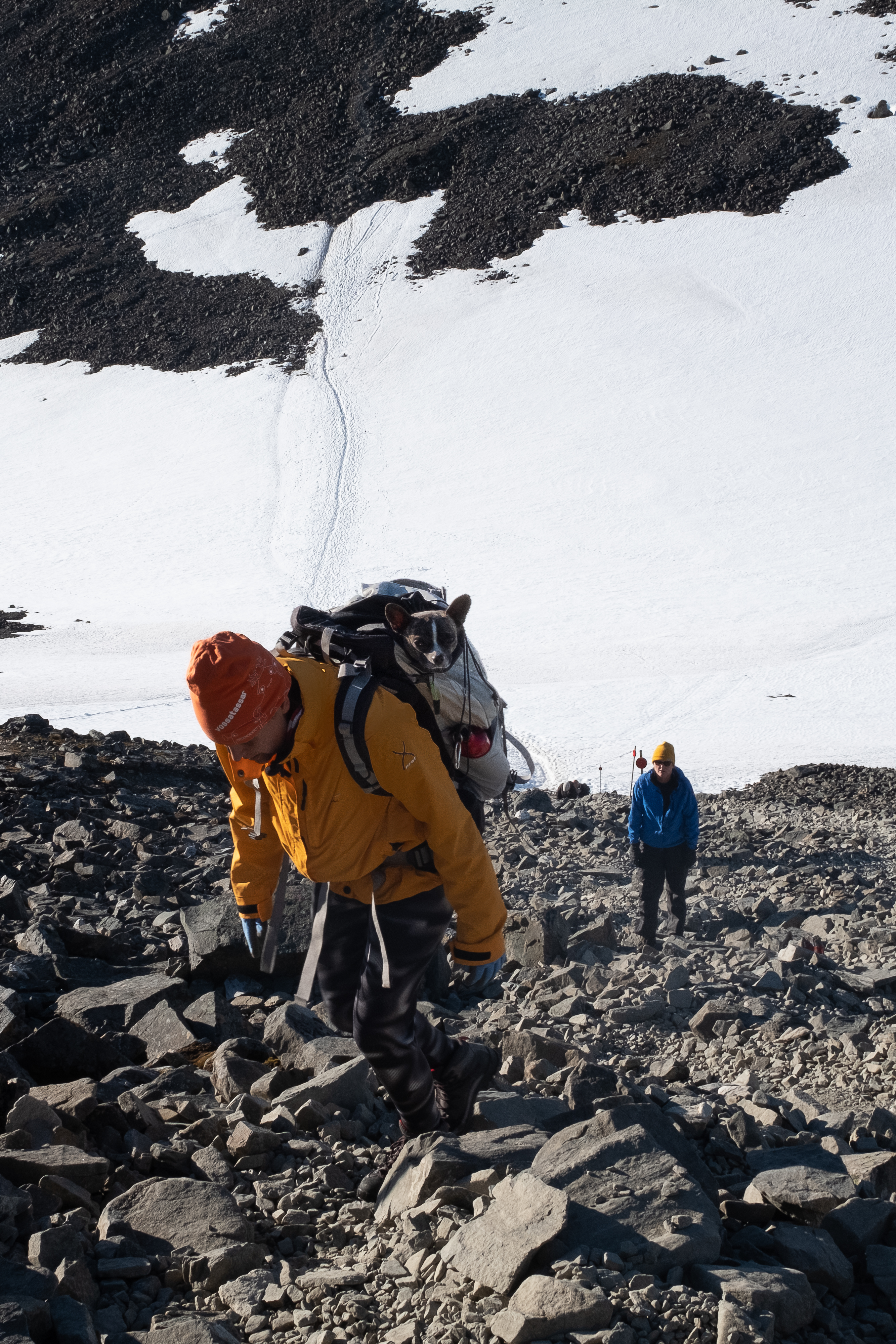
We look across the crevice and notice a dog in someone’s backpack.
I take my hat off to have drink some of the melted snow and it flies away.
Eventually we climb halfway down the second hill and notice slide marks on these new peaks. I suggest we get closer. The people with the dog, once small behind us, are moving in front of us as we do so. We near the marks and it looks relatively safe. I ask if we should do it. Pontus says he will, if I will. We talk about being tired and the chances there’s some sort of bubble in the snow we could fall through.


I decide it doesn’t really matter if it means it’ll save us time. I hope it’s worth the risk and I slide down with my jacket under me. My water bottle is knocking about and snow and ice chips fly in my face. I am distracted and worried that maybe this was a bad idea. I finally make it to the bottom, no water bottle in sight. I wave up top to Pontus who follows suit. We are excited. Adrenaline is pumping and this is a wonderful surprise. Something very different than the peak but arguably more memorable and unique. We took a risk and it paid off. We believe we’ve saved at least an hour of walking.
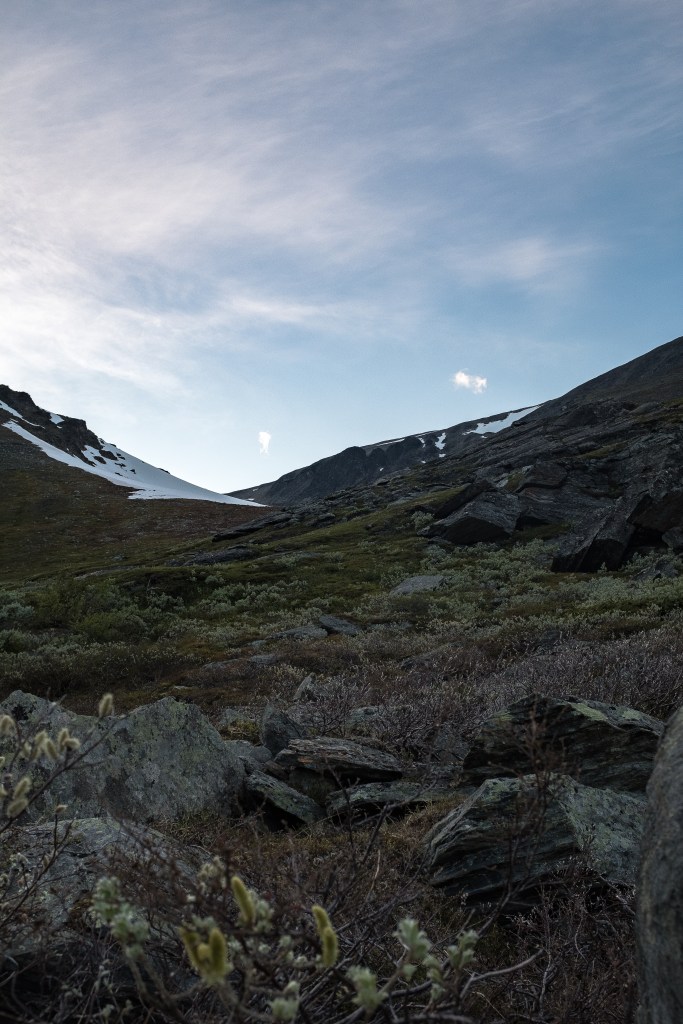
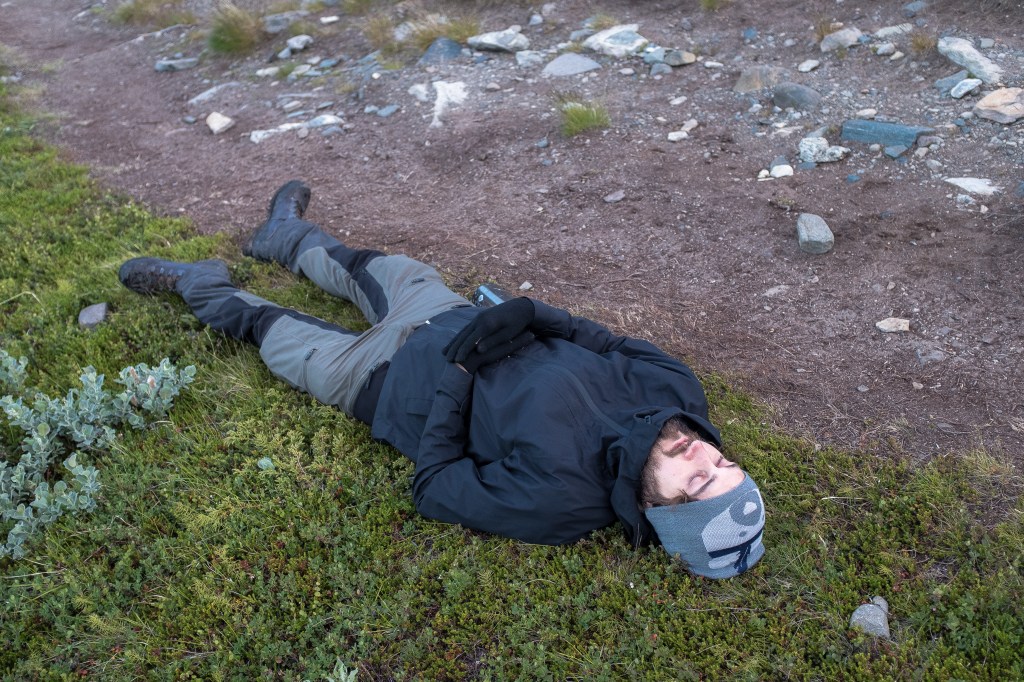
We walk to the edge of our landing and with a little bit of extra energy climb up the rim and find ourselves way ahead of the couple that had passed us moments ago. It is still light out even though it is 10 pm. We’ve been hiking for nearly 11 hours so far. We are both exhausted and as Pontus gets up from his rest I feel something ‘go’ in my knee. I think it’s probably just from being tired.
The final 45 minutes to walk back across the clearing and the cabin into our tents feels much longer. I feel like a child thinking: ‘Are we there yet? What about now?’ We are quiet and barely speak.
We make it to the tents, smile at each other and say ‘see you in the morning’.
Day 3
I wake up. It’s day three. My mattress is deflated. I hope it’s just me and I want to believe it’s because I didn’t press the plug in correctly. I am sweaty and cold from being in close contact with the ground. Two nights in and I’m aware my mattress will probably no longer hold air throughout the hike. The morning is thick with dew and the interior tent walls are dry but the floor is damp and moist. The air inside the tent is thick and wet, like a sauna with the door closed after the heat’s been taken away.
What was supposed to be the hardest part of the trip is over. We climbed Sweden’s tallest peak and the rest is, I suppose, simply a long walk. I can feel my ankle swell but don’t make much of it. I’m sure It’ll get better once we start walking. Eventually, we both acknowledge the other is awake and make little small talk. We get dressed, pack and walk to the restaurant.
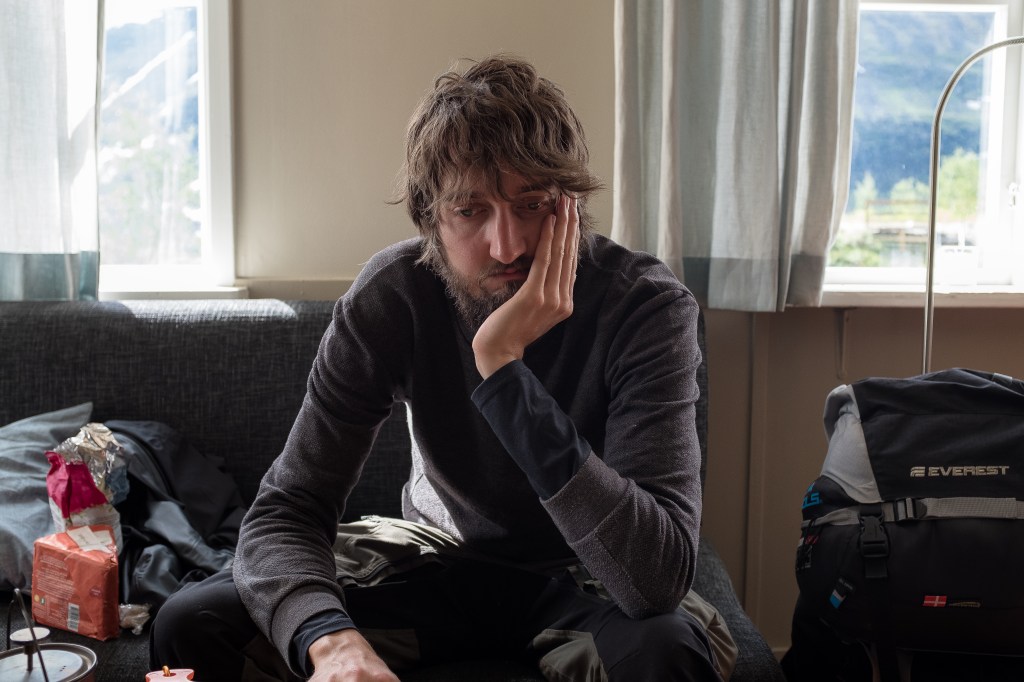
They have a buffet and beer on tap. A godsend and a misrepresentation of all future stops on the trail. We sit down at a large wooden table and each have a draft beer and a traditional Swedish lunch which consists of Swedish pancakes, mash potatoes, bacon and lingonberry sauce. Though we’re both vegetarian, we cheat and eat the bacon. There is no good vegetarian alternative and energy levels are low. We both feel we need to stock up before we move on. There’s also those Swedish prices to consider.
The beer is over 3,5% (in other words not folköl) and it is cold and delicious. The food, warm and unlimited. We stuff ourselves knowing neither option will exist for the next few days.
My ankle starts to hurt a little bit more and my right knee seems to be getting more uncomfortable.
After lunch, we sit down and let the phones recharge as we map out our next stop.
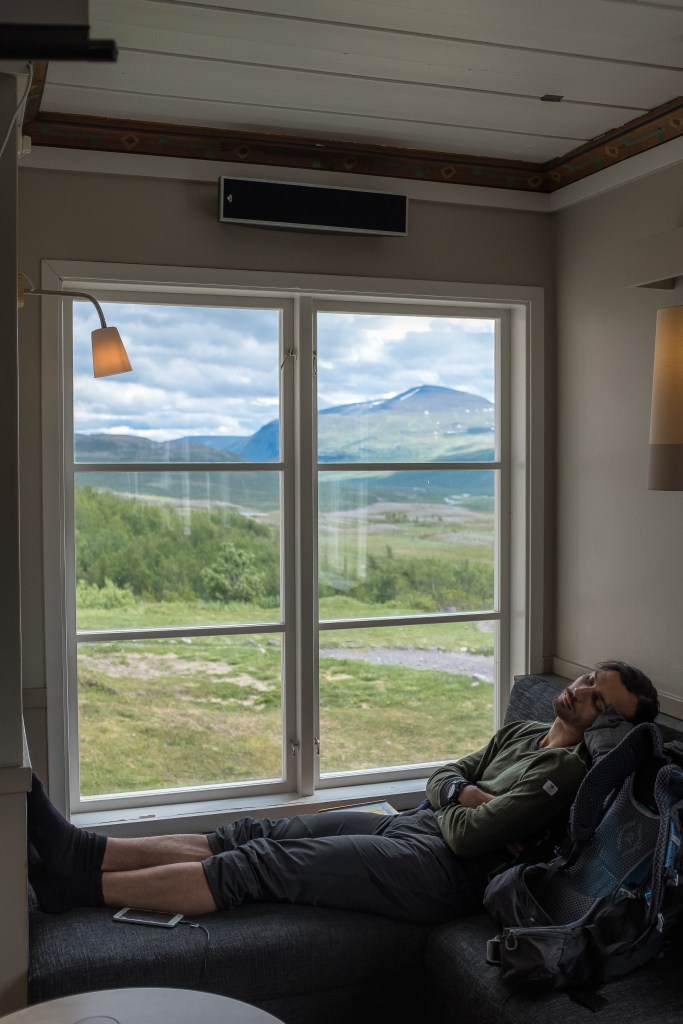
We pack our gear and head out. The walk out of the camp feels different than yesterday’s. Morale isn’t low but it’s also no longer peaking. We are excited, but it is a wearied excitement. We only now come to understand we’ve only just begun… (think of the movie 1408 when that Carpenter’s song comes on)

The streams are running, the sun is out and the wind is blowing. It doesn’t take long before I realize my ankle is doing something very strange and we find a meditation rock so that I can try and do something about it.
I sit down and have a beer and a think. The beer should help with the ankle but it is mostly to lighten the load. I take off my boot and wrap my neck guard around the ankle hoping to give it more support. Pontus and I talk options and I say I’ll suck it up. We’re here after all. I can’t back out after only 3 days.


There’s plenty of open space out there. I realize I need to complete this even if it’s going to hurt every step of the way. Finding someone who wants to spend 7 days hiking isn’t all that common. It’s even harder to find someone you think you’ll get along with to do it with you.
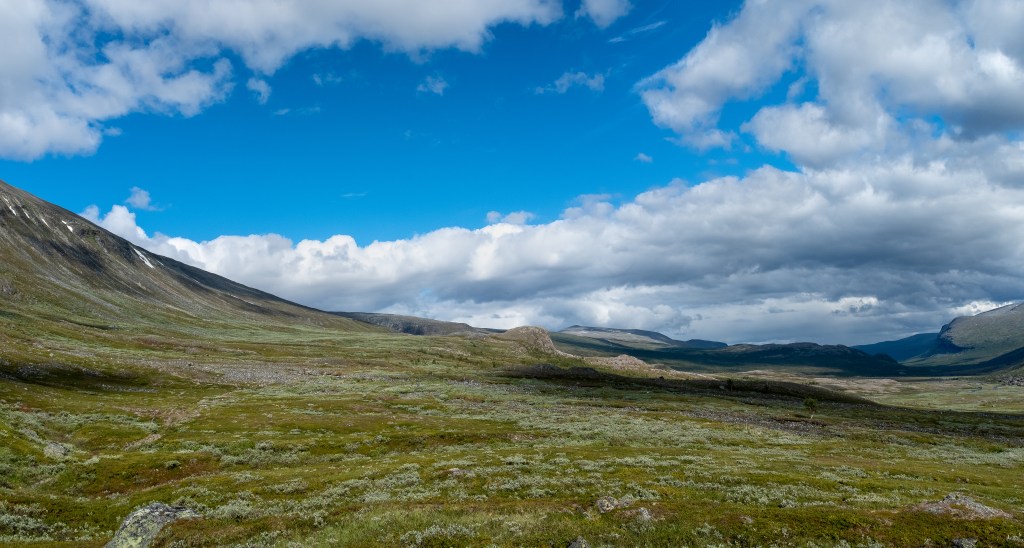
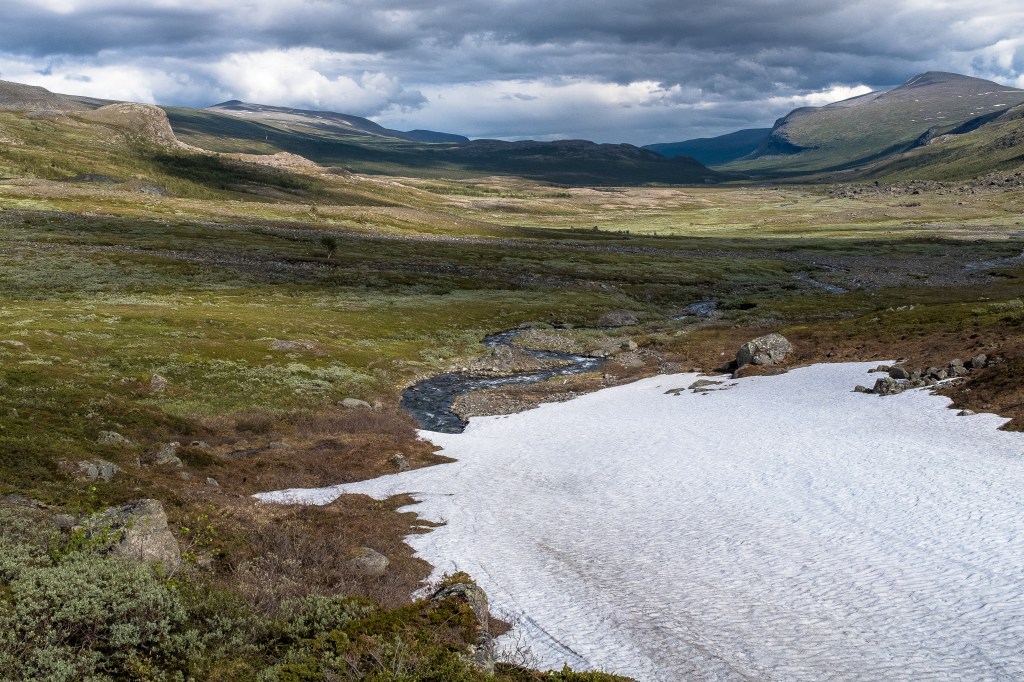
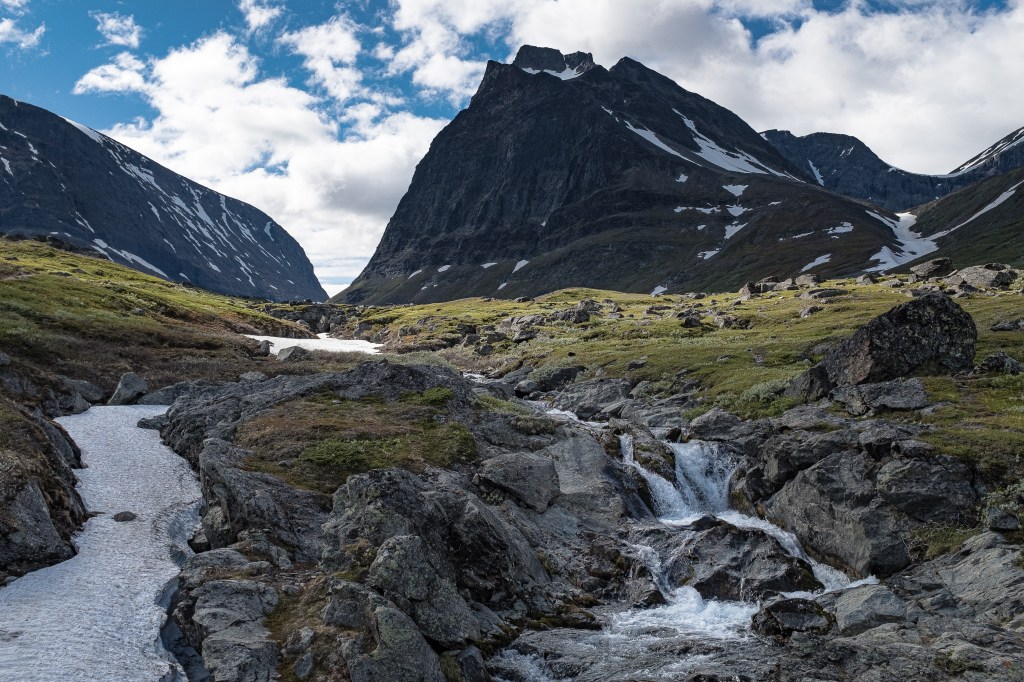
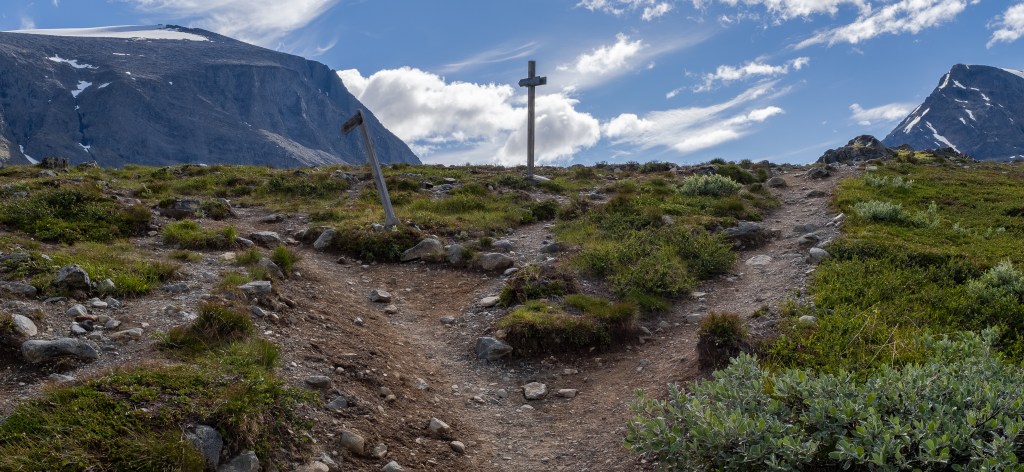

The trail is well marked. While we don’t have too much experience in order to compare, it seems, at least at first, hard to get lost. The markers consists of red x’s, tagged rocks or arrows and they seem to pop up whenever there might be doubt as to the next turn or possible direction.
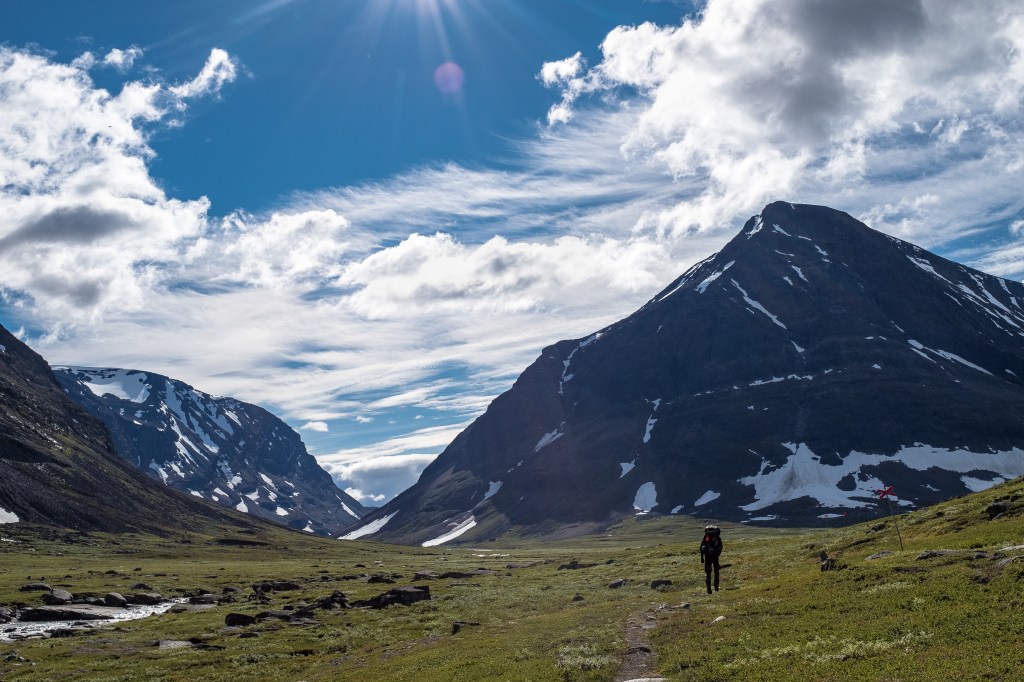
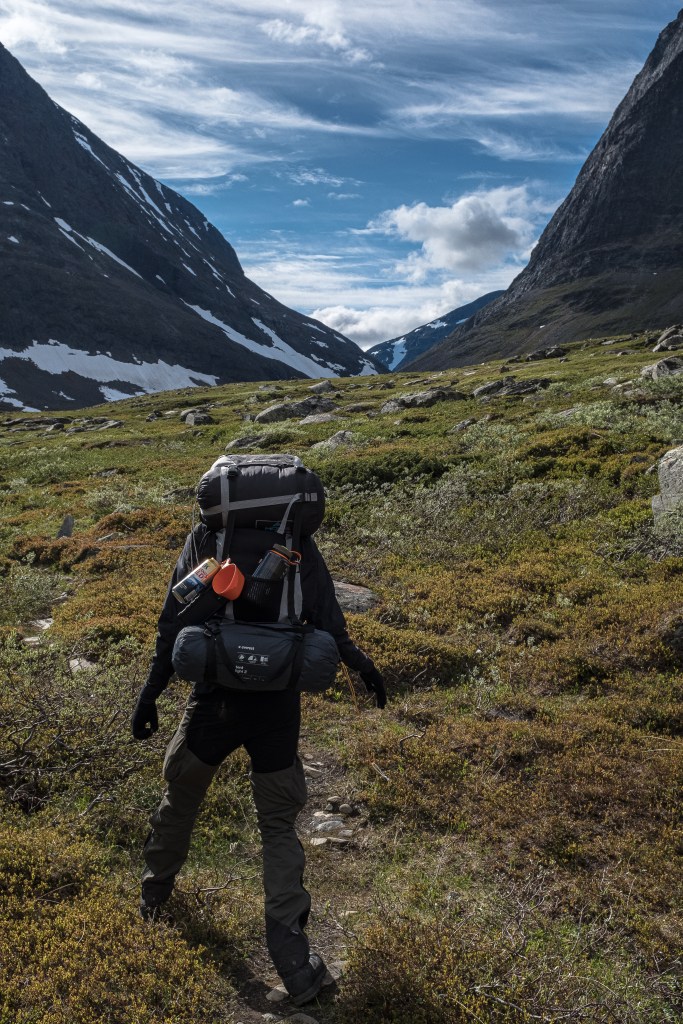
Sensation wise, at least for me, this will be longest span of the hike. I’m still getting used to my adapted way of walking and I am consistently conscious of my awkward movement. I can’t really zone out like on the first day because of the pain and realize this will definitely become a mind over matter moment.
Moving forward, it is a more redundant space. We are within a valley and very little seems to change as we move inward. We find strange looking rocks, what seems to be a large variety of plants and flowers but few to no animal encounters.

The mountain ranges are beautiful. The streams are beautiful. But, purpose often gets in the way. We aren’t in a rush, we aren’t running or moving overly quickly. We just don’t really stop. It’s kind of like being on a train ride where everything is moves slowly but ever forward. You can glimpse back and see things at a different perspective but it doesn’t quite feel like we can or ever will have the proper ‘opportunity’ to sit and let the environment wash over us the way we’ve been led to believe it should.
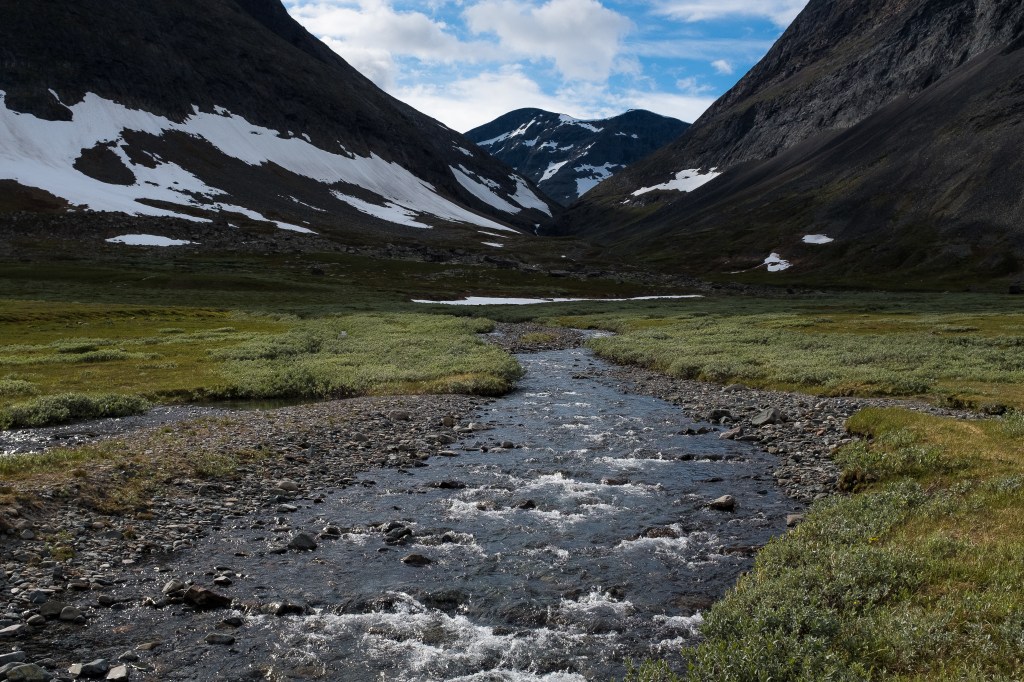
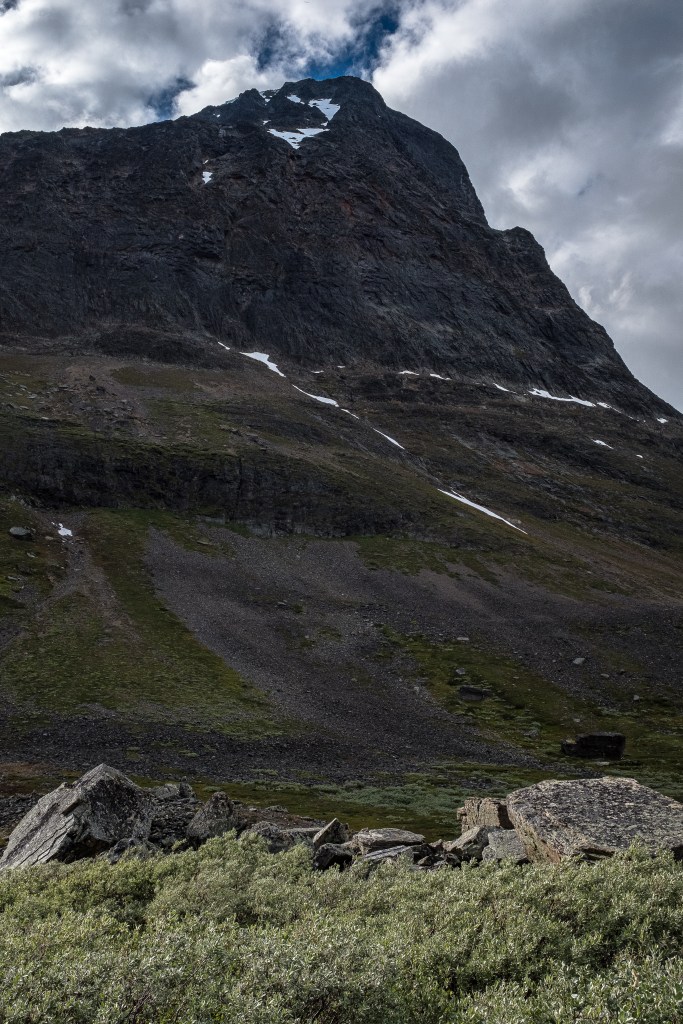
We are now above the tree line and trees of any sort are non-existent. Though we’d planned on making bonfires every night, we realize too late you need firewood for that and we won’t be seeing any of that until the very last days of the hike.
There are more beautiful rivers and streams but after a while it all feels like deja-vu. We are too aware of the length of the walk to really stop and ponder every natural wonder we stumble on. We don’t talk as much as expected, focusing on the task at hand, keeping dry and moving forward.

Halfway through the day we generally walk at different speeds. My knee is hurting and I have to swing my leg to move forward. Imagine a man walking with a peg leg and it’s something resembling the movement I now walk with. We’re not walking side by side but rather front and behind continuing with the left, right, left of the march.

We periodically adjust straps, and the weight of the bag from left to right shoulder anytime we take a break.
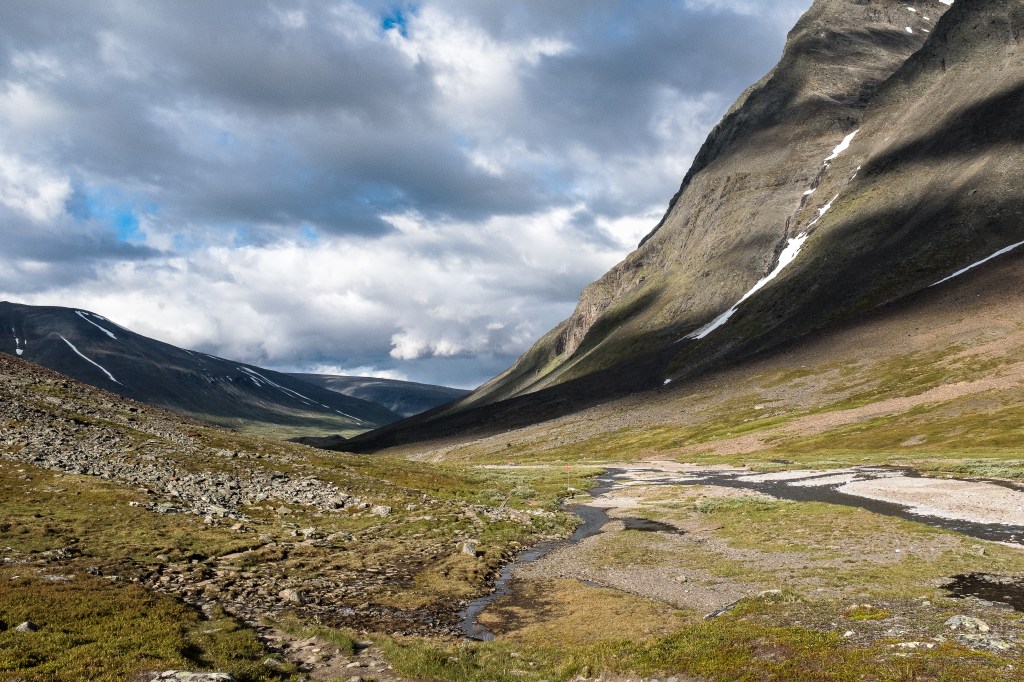

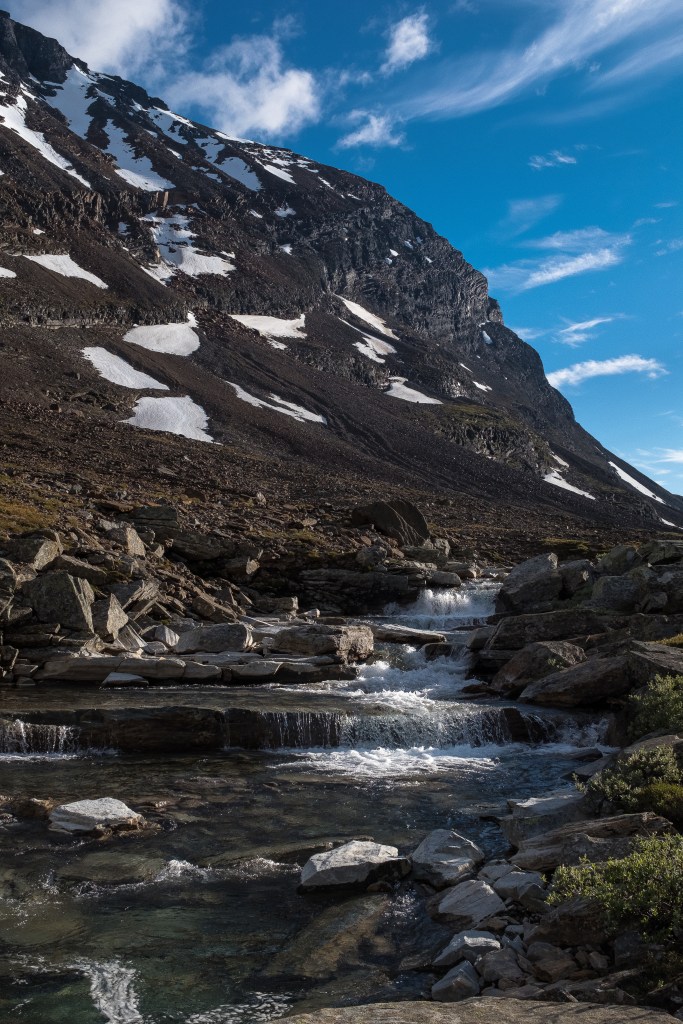
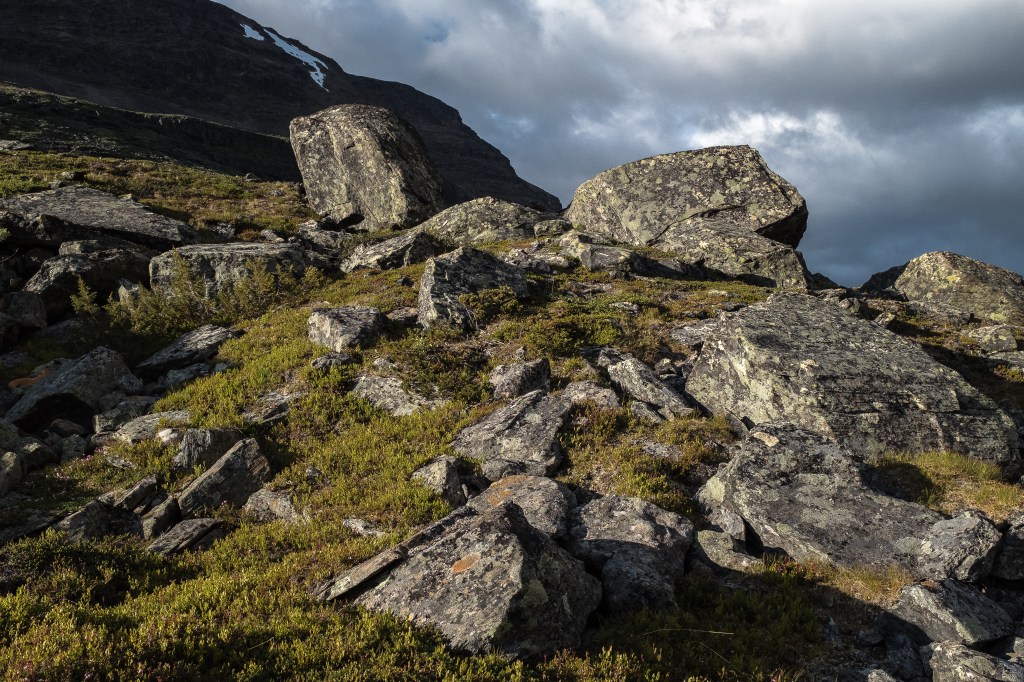
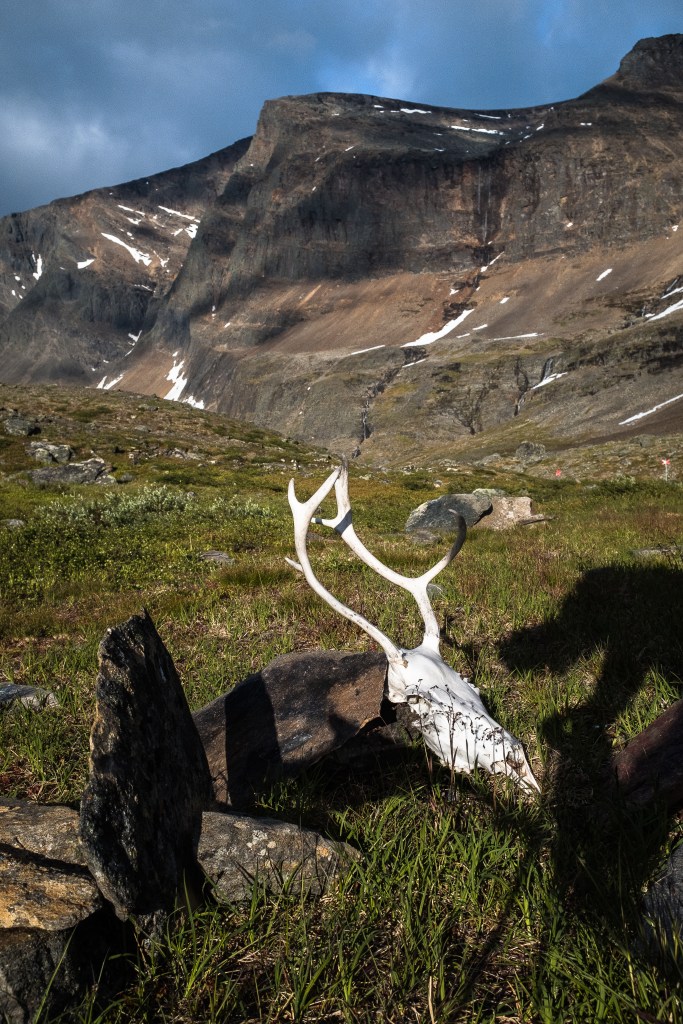
At one point we seem to get lost. There is water rising slightly above the grass and the signs have now become few and hard to come by. We debate turning back but at the last minute find a marker far off to the right. We walk across the ‘swampy’ water and slowly see a hut. The flies are coming out and the mosquitos have started to bite. We are both tired and I think a little frustrated with our pace. The knee is slowing us down and Pontus has to be patient as I simply can’t match his speed. By the end of the day, we’ve walked nearly 12 hours.
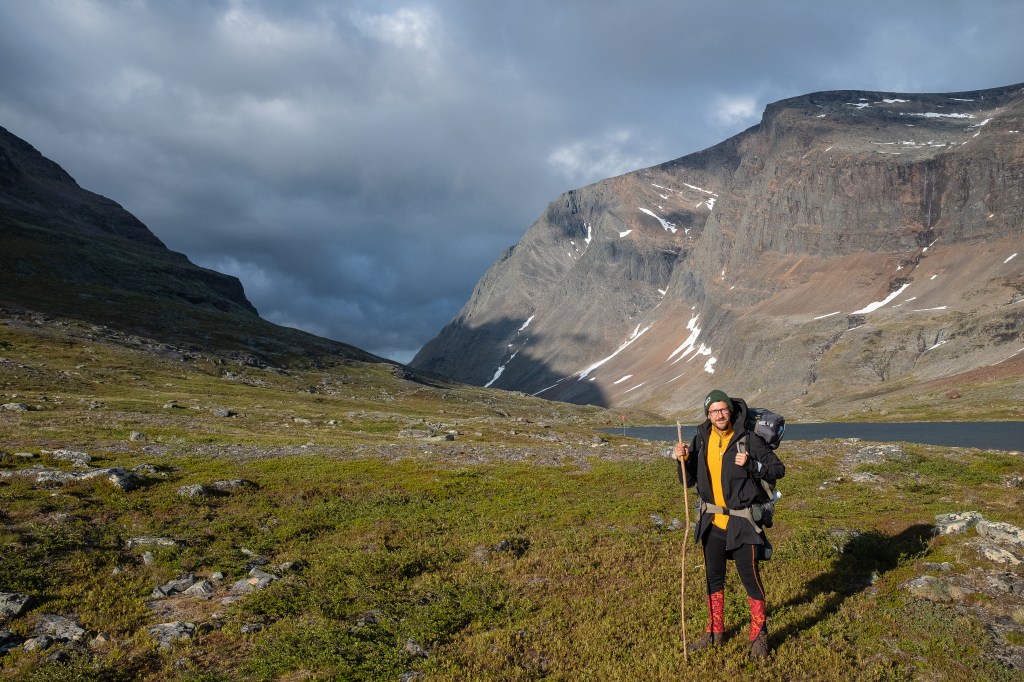

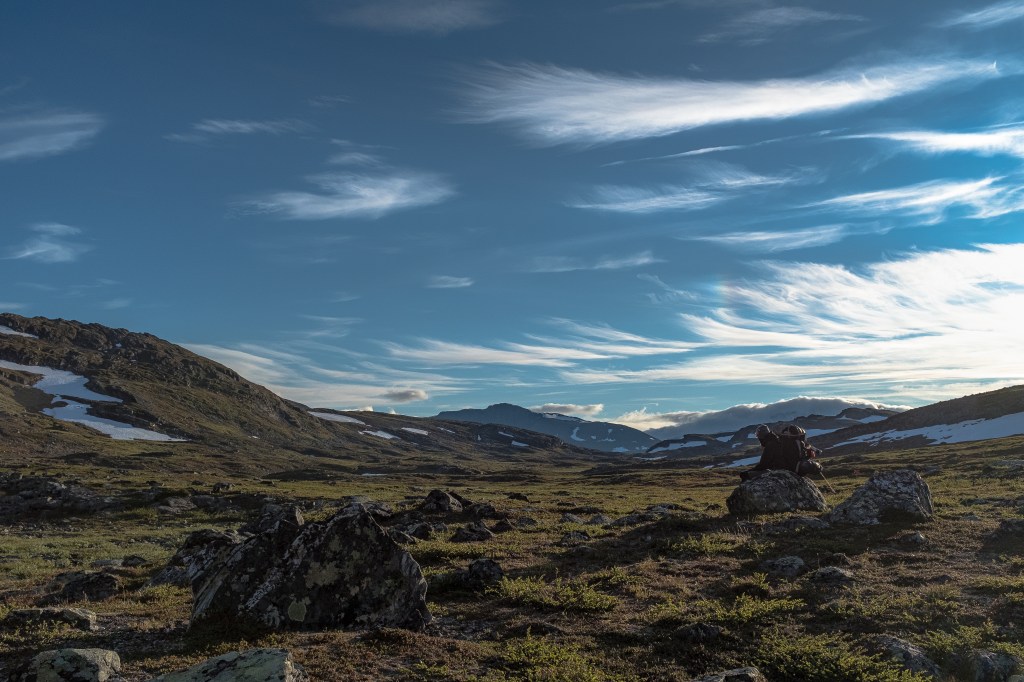
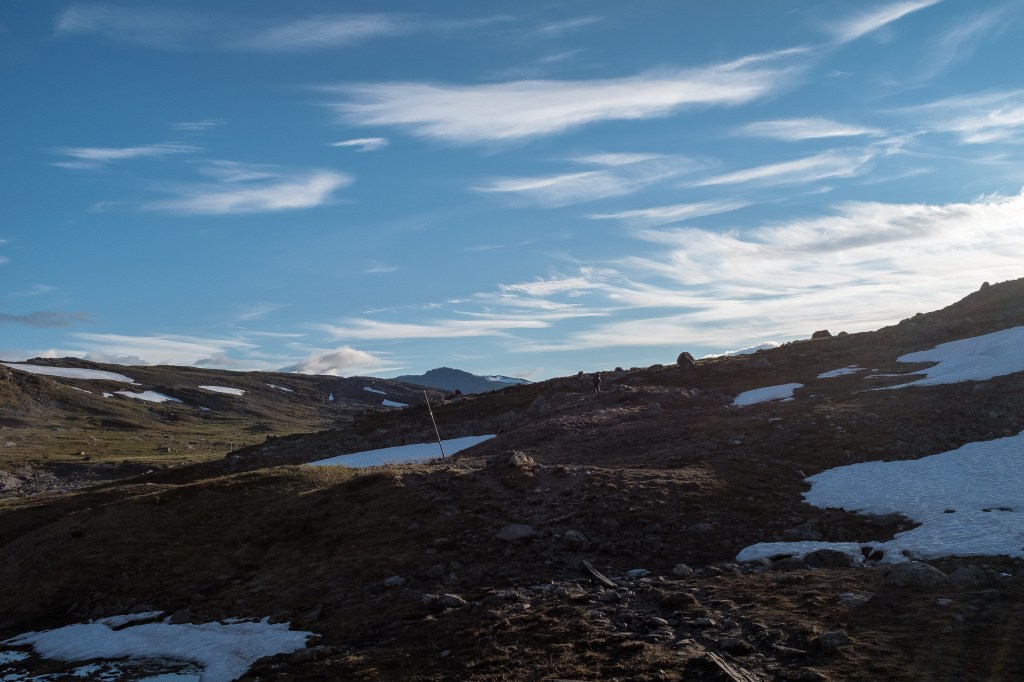

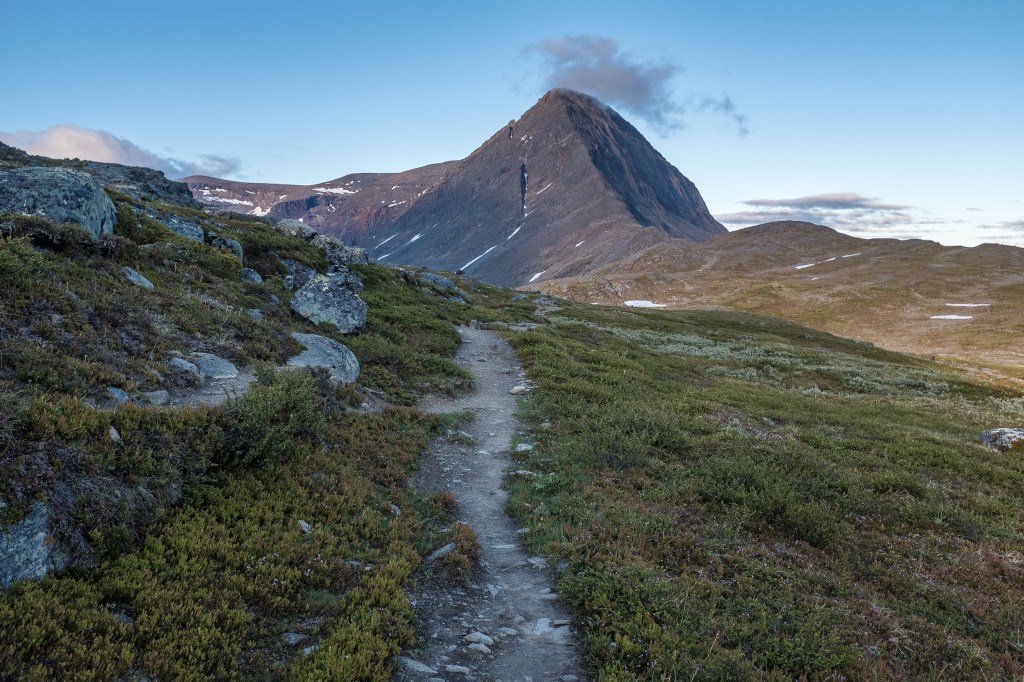


We set up the tent in a field that overlooks what appears to be a sumi village. Someone told us the day before they’d seen reindeer being herded around the area and we hope to experience something similar. We don’t.


The bugs are bad but we try and make the most of the light. We sit and have a sip of whiskey. Black flies, gnats and mosquitos swarm. Conversation centers on bugs, lack of fire, the possibility of rain and blisters. We pack up soon after and pass out.
Day 4
We wake up and pack up the tents.
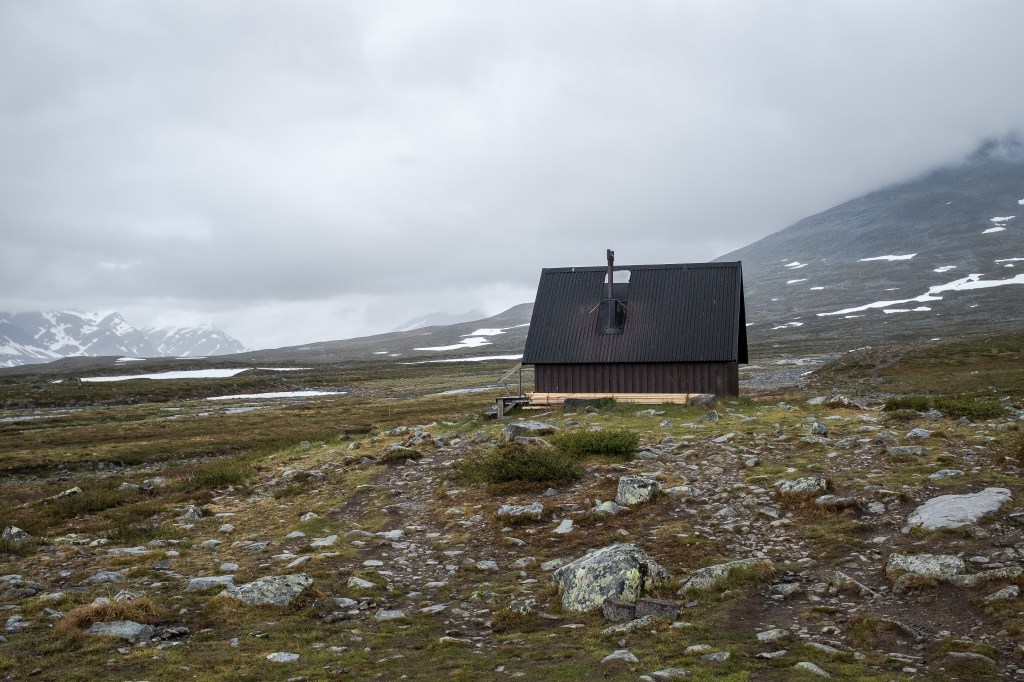
We start walking and soon see a cabin. It is glorious and beckons us forward. The weather is terrible and we rest for a short while. It’s dry and we’re in no rush to get back into the wet, damp air. We’re lucky enough to find a little kindling in the cabin and start a fire. It seems like a good time to try and make some coffee.
The Swedes we competed with on Kebe soon join us. The most talkative one has an honest to god John Wayne accent. I think he’s mocking me until I realize he never breaks character. He’s learnt english by watching movies and he must have had a predilection for Westerns. We share the fire, warm up and make small talk. They’re young. 22 and 23. Some have recently completed basic training in the Swedish army. They’re from up North and each plans on going their own way. It’s their last trip together before life changes.
Pontus and I look at each other and wonder if they’ll tell us what happened on the mountain. It turns out we don’t have to. The smallest says he didn’t make it to the top. He says that’s why we didn’t see him when we ran into the other two.
They start to tease him but then he reminds them that they also took a helicopter down.
Pontus and I look at each other. We thought it might have been them. They start making excuses defensively. They say it’s only because there was already a couple at the top and they each contributed 2000-2500 sek (200-250 euros) for the flight back to the base. They made it back 30 minutes after their friend had walked back down.
We’re glad we walked back. We feel like we accomplished something even greater than before knowing these are suppose to be some fit son’s of bitches. They’re younger and in training and they called a ride to get off the mountain. We think: ‘Not bad for a bunch of 29 year olds’… or maybe it’s just soft basic training in the Swedish Army….
Soon after they pack up and head out. They give us ‘old school’ chewing gum before they go. It’s called something specific in Swedish but I can’t remember the name of it or find it online.
We drink a little bit of whiskey and heave the bags onto shoulders. The march continues.

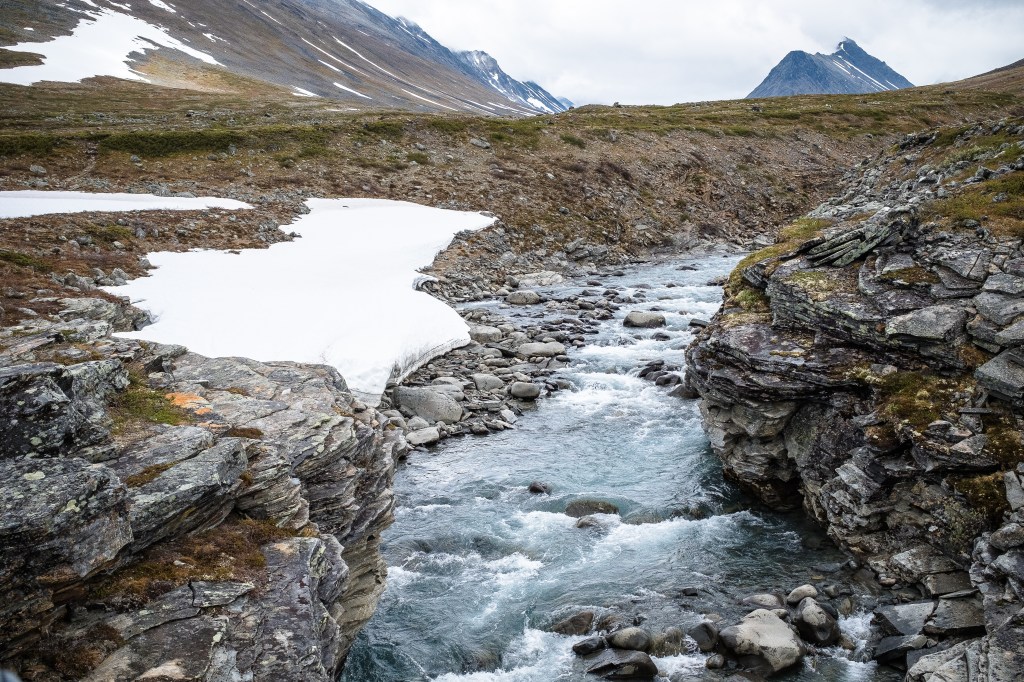
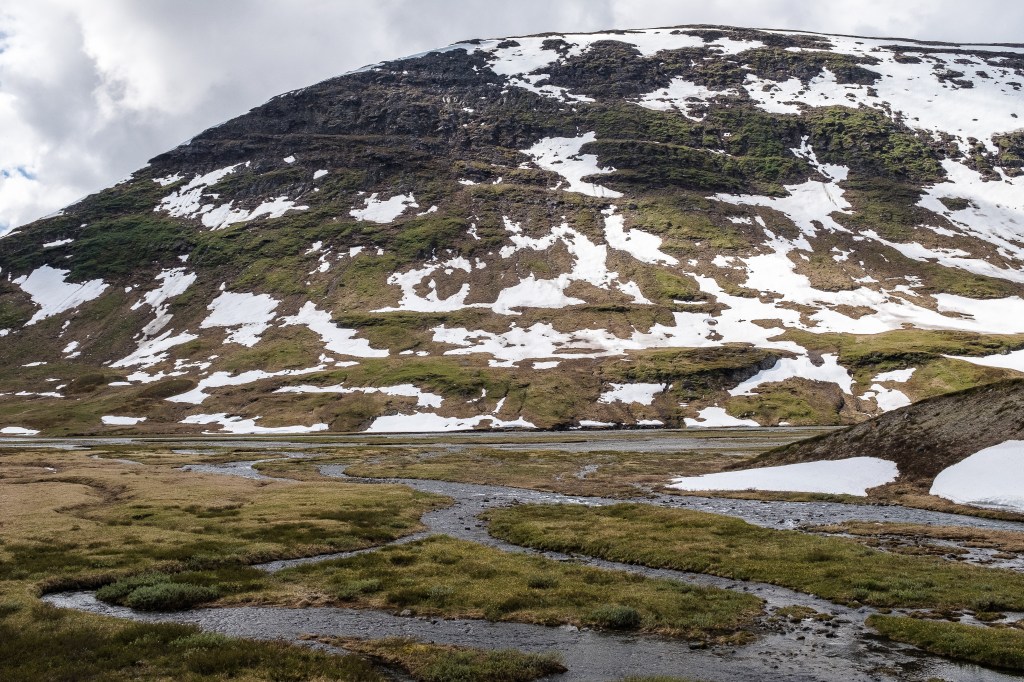

The wilderness here is more varied. There are running streams, mountains, snow, grass, moss and rocks. The footing is more inconsistent which means you have to be more careful when you walk. Something people often fail to mention while hiking is how much of your time is actually spent staring at the ground making sure you aren’t stepping on uneven, rough, wet or slippery surfaces.
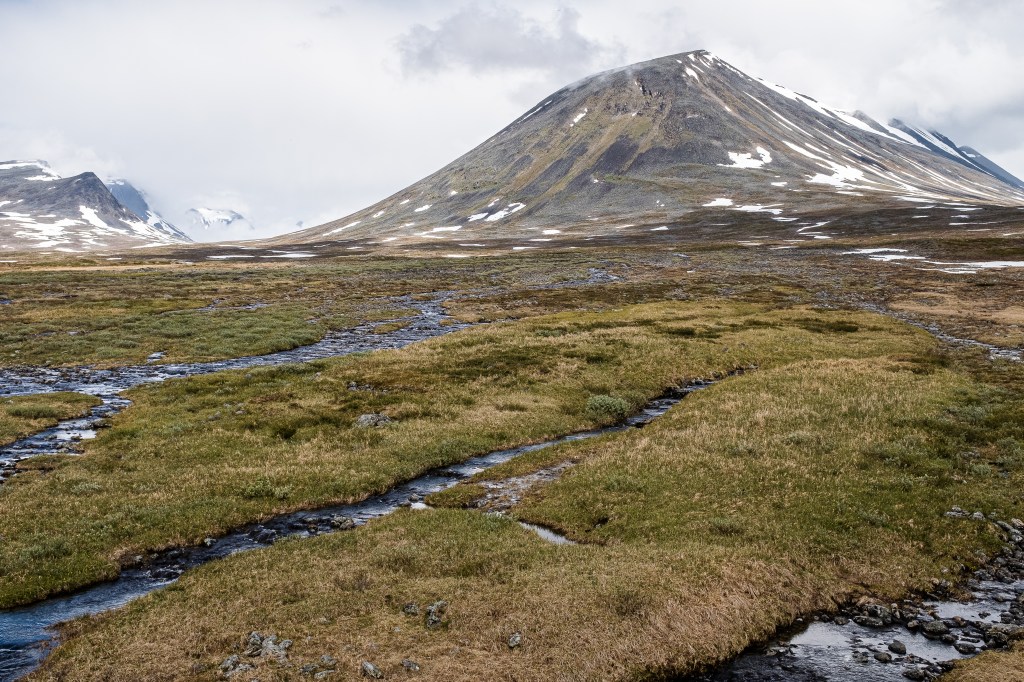
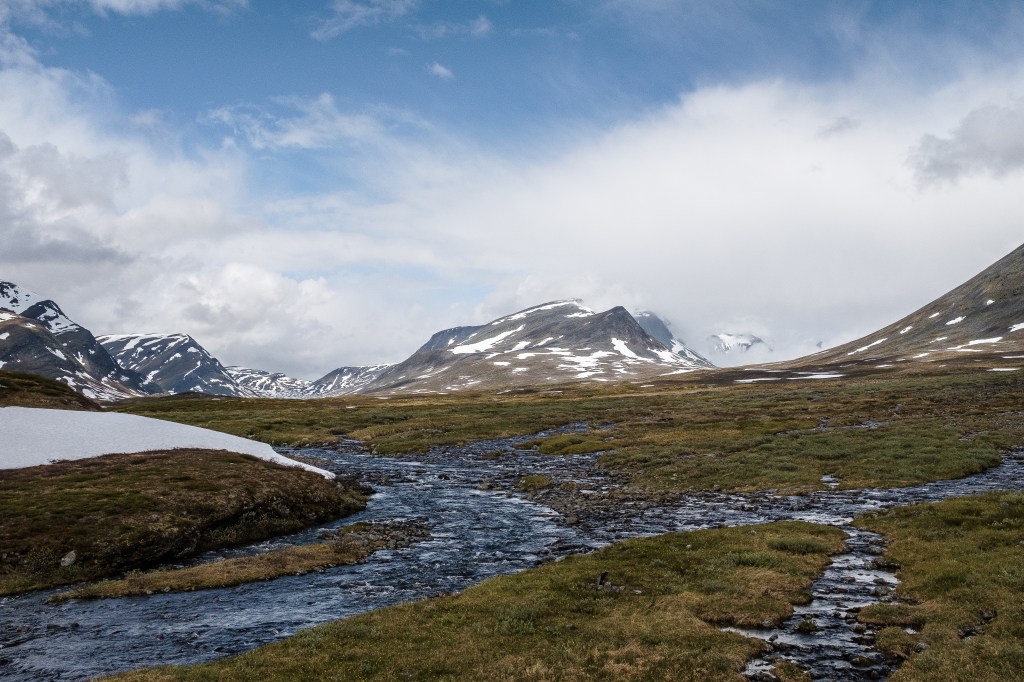
Later on, when Pontus and I reminisce about the trip, he mentions how ponderous walking for ‘long’ periods of time can feel in daily life. A few days after he got back from the trip he decided to walk home from work and, 45 minutes in, he felt ‘existentially’ exhausted. This isn’t the word he used, but what he was trying to get at, is that he felt the passage of time, he felt an awareness of just how long it took to walk home and he was conscious of the other options at hand, namely the car, bus or bike he could have been on in order to save time.
The thickness of time is a strangely felt phenomenon in the city, one that quickly dissipates in the wild. Options are wonderful but they bear a psychological weight. They add to the guilt of daily life because they provide a choice and choices come with the possibility of a mistake. Transportation is possibility but also a ‘time machine’ of sorts. Cars and buses, longboards and rollerblades allow you to feel as though you’ve saved time but they bypass or at the very lest change your relation to space. I sometimes think I can longboard and take pictures to ‘save time’ and the photos never come out the way they would if I were walking. Too much energy is dedicated to physical balance…
My memory may be foggy as to the exact nature of Thoreau’s take on this, but in Walden, he talks about the strangeness of human logic in the age of industry. That in the hustle of the work schedule, we often deem it worthwhile to work for two days in order to afford a horse carriage or ‘car ride’. Now this ride may seem like a logical thing to do until you realize, that you could skip working for those two days and simply walk to your destination, enjoying your surroundings, in a immersed way that a fast moving vehicle would never allow you to do….
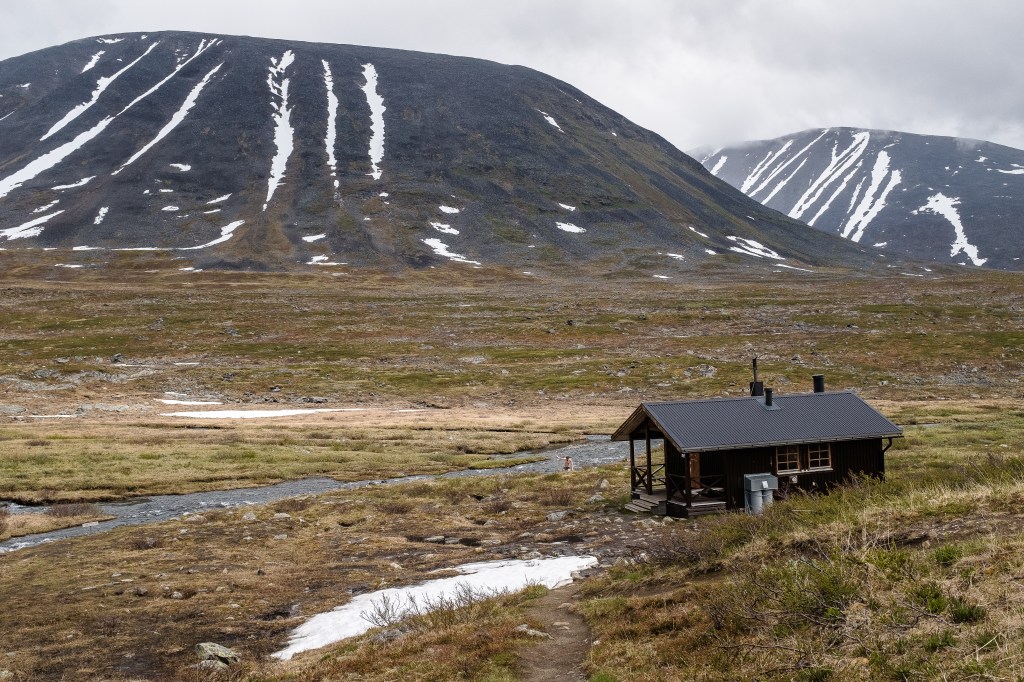
We get to one of the key stops along the route. They have expensive 3.5 heinekens (folk öl) but they are cold and delicious. We both buy one but Pontus decides to jump in the river beforehand.
I packed baby powder and wet-naps and it’s part of my daily morning and night routine to wipe down what George Carlin would call the Necessities. That morning, when Pontus opened his sleeping bag he loudly exclaimed he could smell himself. He’d been talking about washing up ever since. He did not bring the ‘army’ essentials for cleaning and the river, although freezing, he proudly exclaims, washes away the stink.



We continue walking and meet up with some eccentric hikers, two men and a child running back and forth with energy we could only dream of. They notice us crossing a stream and immediately ask Pontus if he’s drunk. They use short declarative sentences. They are Danish and strongly suggest we camp out before attempting to cross the mountain.
We’d notice for a while that the weather, boot wise, was getting worse, with snow, ice and water having long replaced grass or any semblance of dry ground.
We debate if we should listen to the advice. Pontus is keen we can still make it. My ankle and knee suggest otherwise.
We set up the tents on what appears to be the driest location.

What happens next is one of the weirdest moments of the trip. I’ve been holding it in for a while and the oats and nuts are making me uncomfortably full, heavy and slow. I decide to walk up to the base edge of the mountain with a roll of bio-degradable toilet paper. I finish and as I go to cover it with the rock nearest to me, I discover, lifting it, that someone, some time ago, shit, not 30 centimetres away from where I just did.
I drop the rock and cackle. I’m not sure if has to do with necessity, location or some sort of imbued perspective on selecting a desirable, semi-secluded area, but someone, somewhere, had the same choice of vantage point when it came to emptying their bowels. It shakes me to my core. This is the middle of nowhere. There are mountain ranges all around us and rocks, dips and ditches galore. And yet, here we are.
I tell Pontus and we laugh about it. We turn on my portable speaker, which I packed thinking we’d be listening to music every night (it’s the first time we actually do) and sit down and chat about the hike and life so far. This is the only time we do this properly.
Pontus sets up his portable flame and we boil the water and chow down on our freeze-dried bags of food. I have a terrible Tikki masala. It tastes of powder and spice and empty of everything nice.
Pontus is interested in trying it. He says he likes it and he trades me one of his breakfast bags for it. A sort of porridge/oatmeal thing. We’re both happy with the trade, but I think he’s lying.
The Tikki Masala is worst than prison food.
We clean up. We sit and simply let our eyes wander.
We realize we are ahead of schedule. Even with the bum knee, we’re making progress.
We look towards the mountains and above into the nightless sky and it stares back, with a gaze, blank and pitiless that is only encountered when the sun is still visible after midnight…

Day 5
We wake up and it’s beautiful out. We pack up the tents and make some coffee. We enjoy a cup and look towards the wet mountains.

We start moving and we are quiet. I think of my feet. I am wearing both a thick and thin layer of wool socks (recommended by an XXL employee, it is supposed to help avoid blisters). I am also wearing plastic bags. We’ve been warned by the ‘abrasive Dane’ after all, it’s going to be a long wet climb.
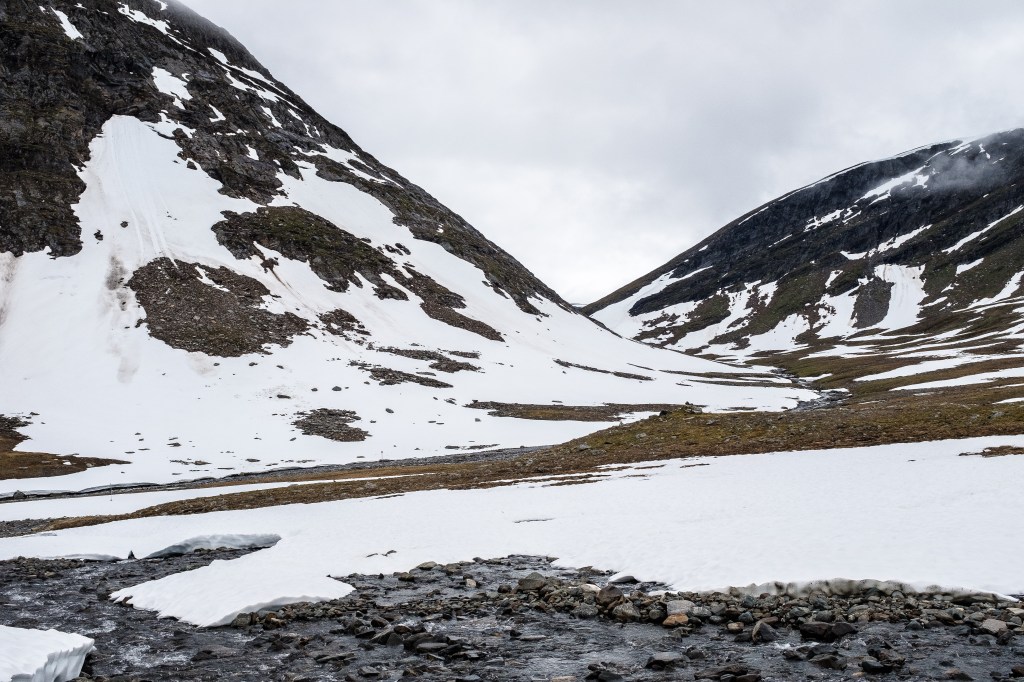
The snow is deeper than it looks and a wrong step means we’re knee deep in slush. We take our time. My ankle is still acting up so Pontus tends to be in the front and every once in a while he takes a break and I catch up. I usually don’t stop to rest. I don’t want to hold him back more than I already am. Once I pass him, he gets up and we continue with this same, oft-repeated cycle until the end of the trip. It is during these short periods of time, these transitional marks where he’s just gotten off the rock that we play ’20 questions’ or ‘fuck, kill, marry’. We play both intermittently throughout the rest of the hike.


The hike up is treacherous but not dangerous. The snow is inconsistently deep and the trouble comes from the possibility of stepping on a thin a surface of snow, breaking through and getting it down into your boots. We take our time and at the top, we find a storm shelter.

Please Take your Trash to the nearest hut!!’

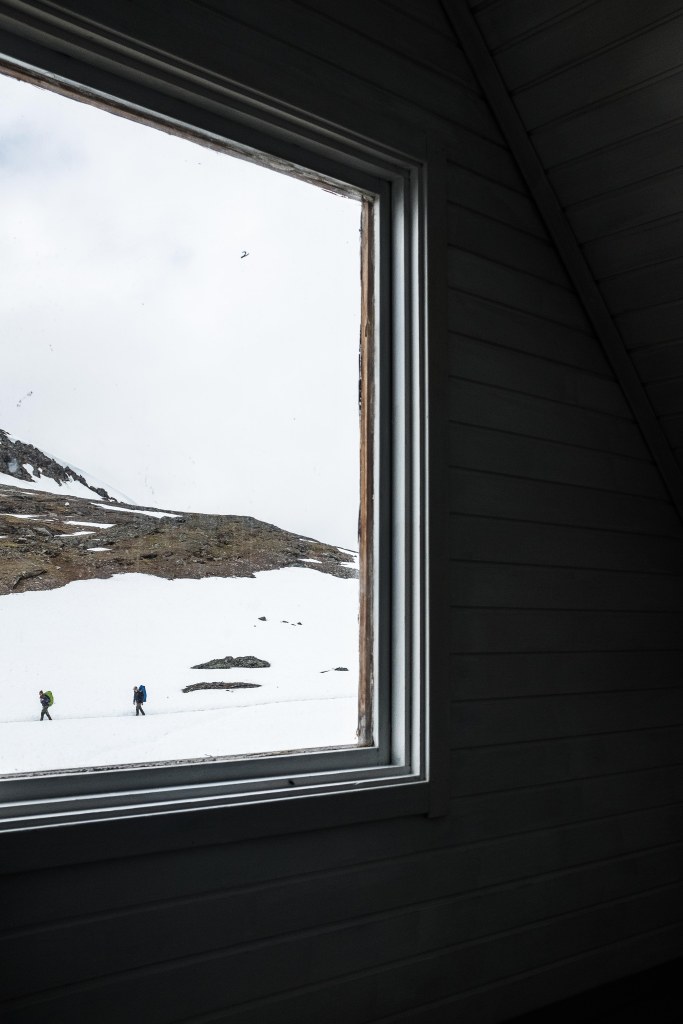
Inside, there is a small fireplace and four people, a family, is already sitting there, removing layers of clothing. They’ve already taken off their boots and invited us to do the same. While we try and warm up our legs and get the circulation going, another man peeks through the window and eventually enters.
He starts speaking Swedish and tells a story. Below is the condensed version Pontus shared with me as I remember it:
You see, he was once lost in a storm. He was hiking with his wife. They’d been hiking the world over but only recently thought of tackling the famed Swedish hills of their own backyard. They’d heard the weather could be bad but they’d been stuck in harsh situations before. However, this time his wife injured herself climbing up a mountain and when the storm hit, they had to create makeshift shelter to wait it out. It took 2 days for help to come. They’d never come back but she’d recently died and now he was completing that hike as a sort of pilgrimage in memory of her.
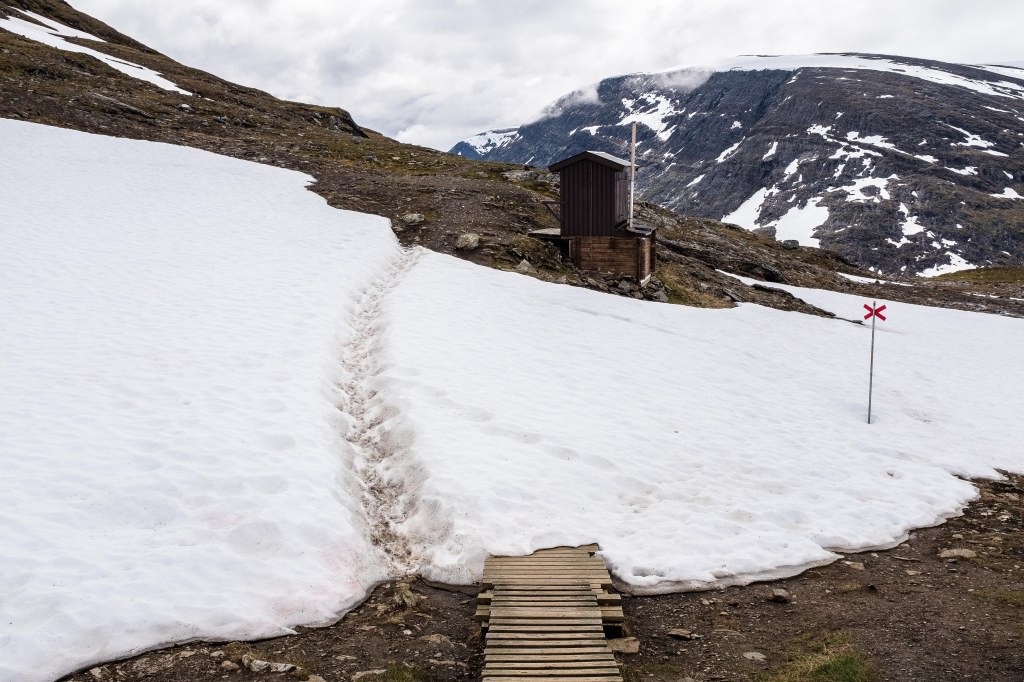



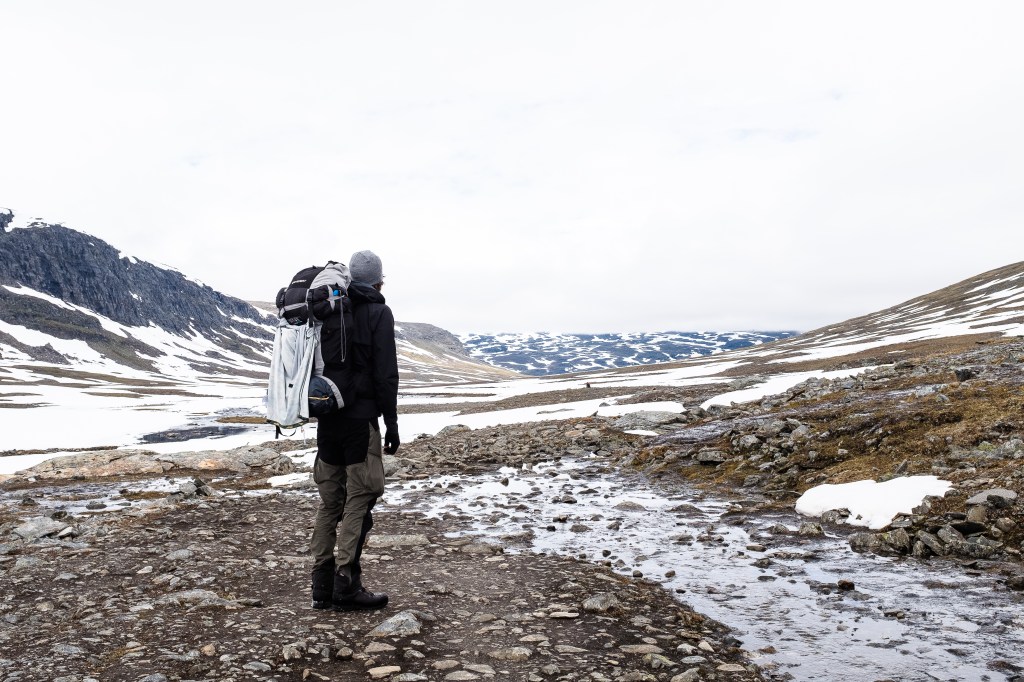
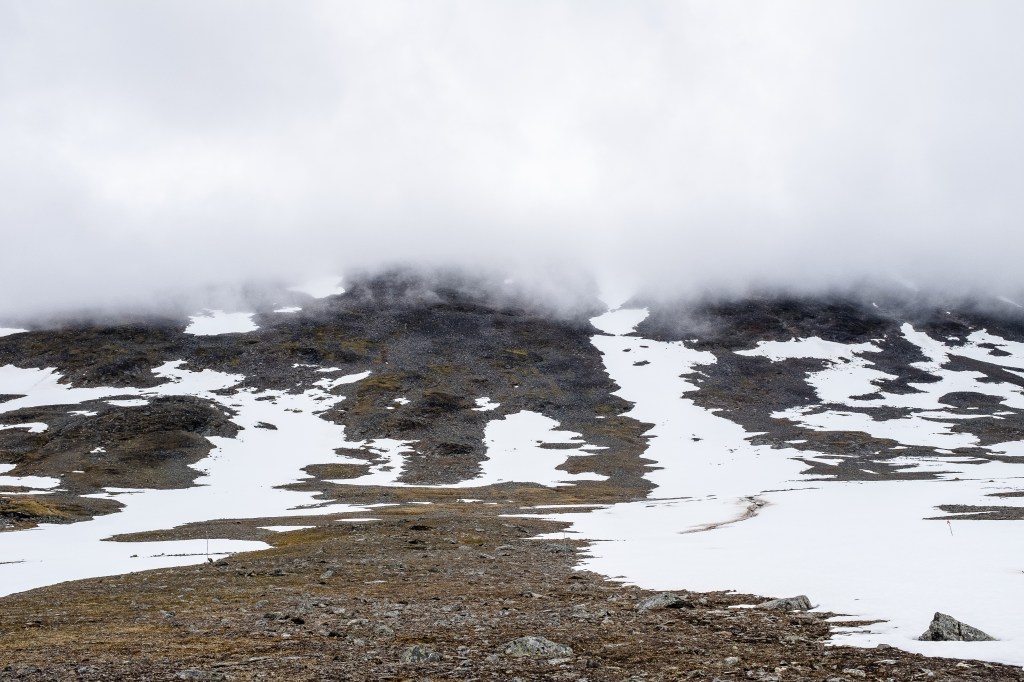


These cabins are the next legitimate pit stop. We’ve made it to Tjäktja. When we get there, we realize that the further in we move, the less well stocked the shops are. We cross a bridge, slowly, and find a free picnic table. We sit down and I have a really hard time even bending my knee to do so. At a distance, another hiker sees me in pain and gives me a painkiller. I try and find whoever runs the place and when someone finally appears, they tell me they don’t have anything to help other than the number for the helicopters. We eat, rest a little, me with my leg extended straight, Pontus on his back gazing at the sky. We pack up and continue.

We haven’t seen fast running water in a while so we refill our bottles.
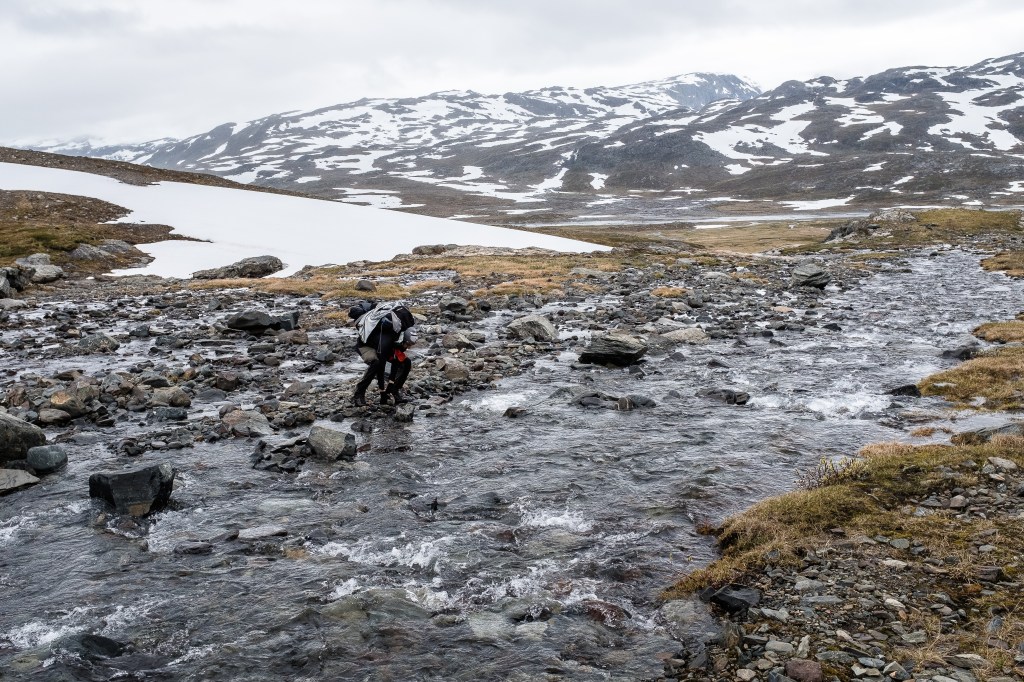

The crossing is difficult, but there’s no rush and we slowly find the right rocks to step on to make our way across.

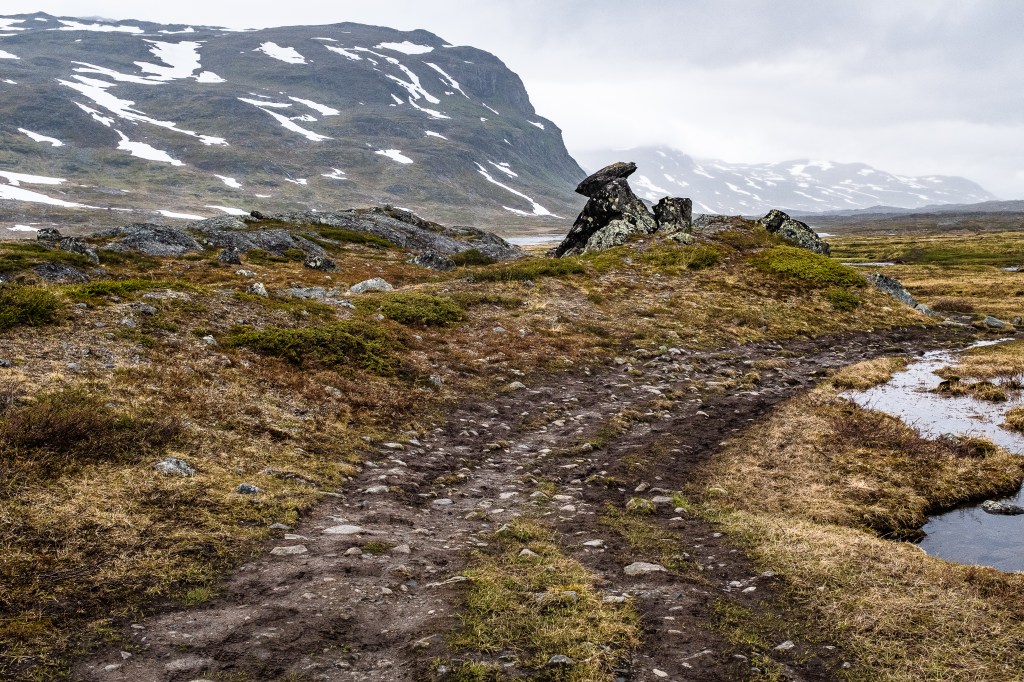
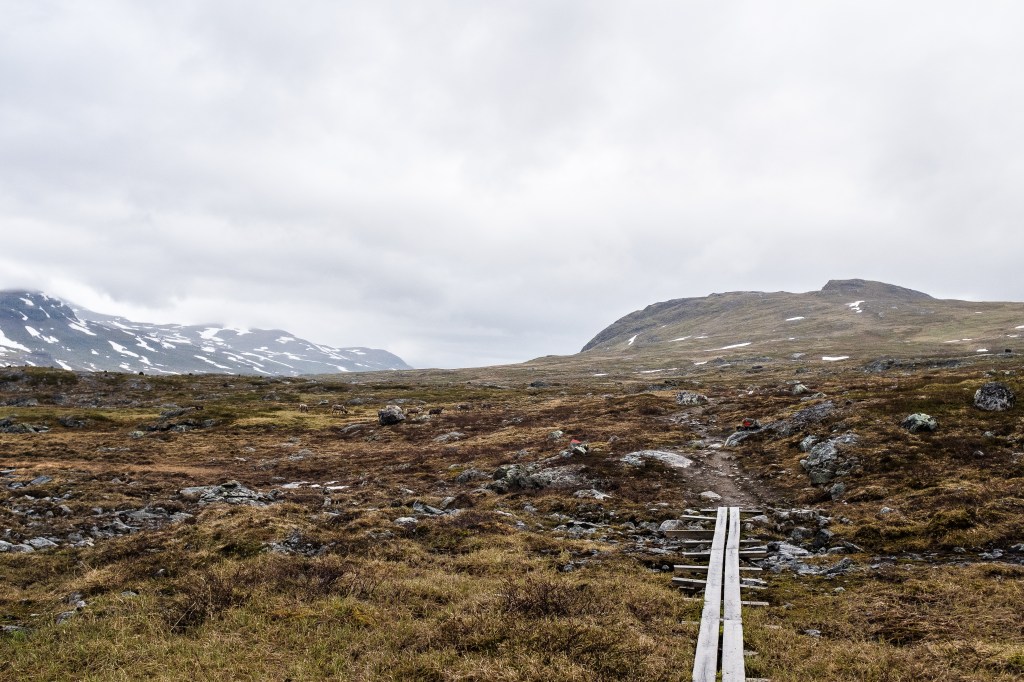
The scope of this hike is starting to sink in. We are moving at a constant pace but it isn’t fast. We want to be careful and our timeline is no longer counted in minutes but rather hours and days.
We both understand that a wet boot or piece of clothing in this weather will stay wet. We need to be careful if we want to stay comfortable.
To be wet is to be cold and to be cold is to suffer unnecessarily if it can be avoided.
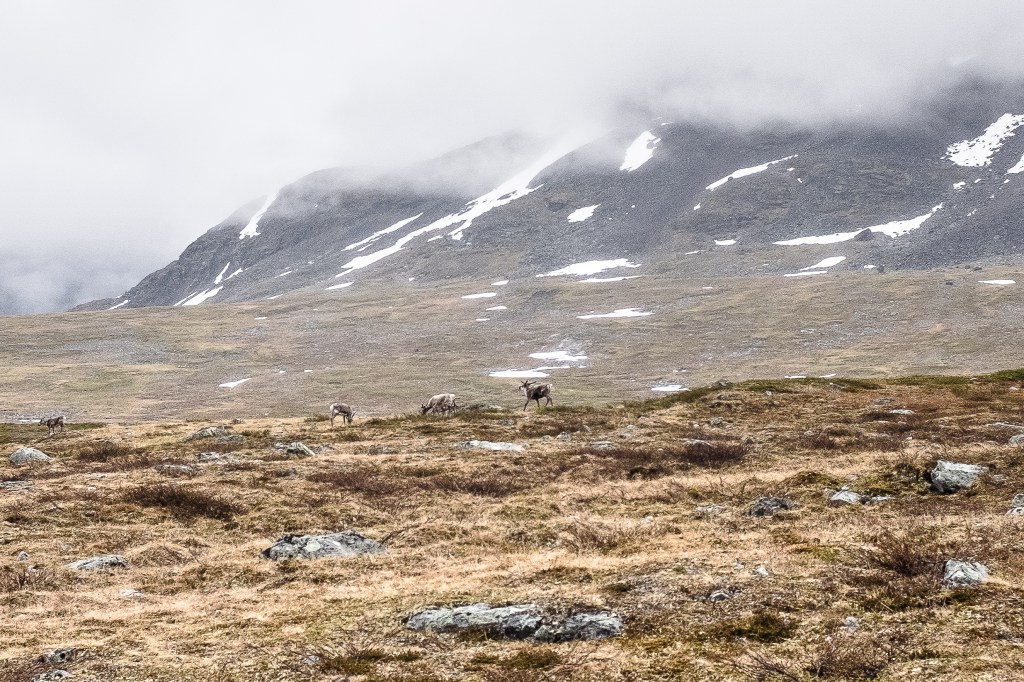
We continue onwards and complete an entire second’s days march by evening.
When planning the trip, I was sure we’d be having deep, heart to heart conversations. That we’d talk politics, government and explore deep philosophical issues in the wild with no distractions. Since the injury, we haven’t been walking side by side too often. Here, in this leg of the trip, everything is wet and slippery and it forces Pontus to slow down. This is the first opportunity we have for prolonged conversation since we started on the first day. We have half-heartedly try and engage on wether or not the death sentence should exist and we don’t get very far. We’re too tired to think deeply.
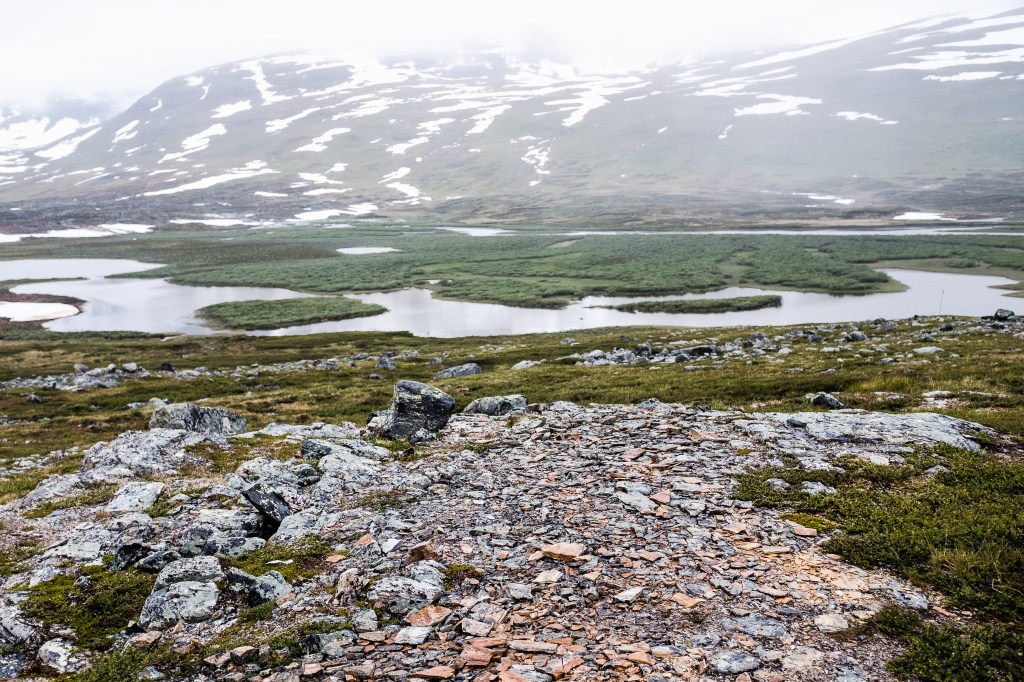

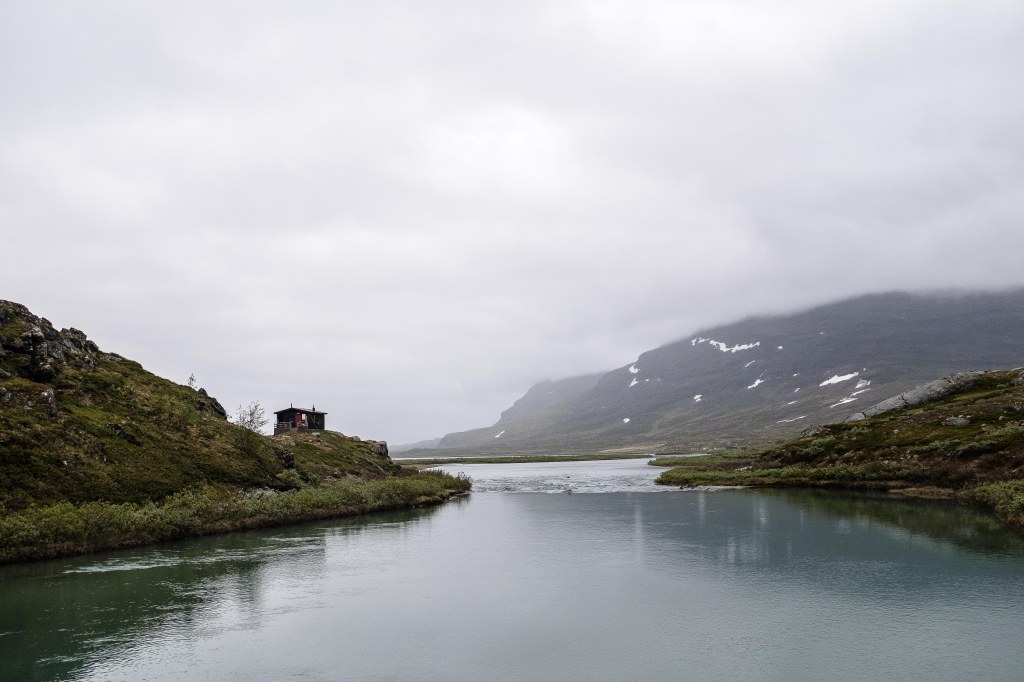
We encounter another huge valley. I am exhausted and I’ve put my camera in my bag to keep it dry but also to take pressure off of my neck. We decide to cross it because we can see a cabin. Pontus walks in front of me most of the way. Towards the end of the valley the sky opens and light finally appears that isn’t dense gray.
We make it to a small hill and walk up a slippery slope. There’s a small restaurant/dry space. We buy noodles and snacks and the innkeepers let us stay later than usual so that we can take advantage of its dry warmth
Soon, we hear the rain start so we limp out and quickly set up our tents. We’ve become pros and we’re glad we can do it quickly. It means our clothes can stay dry. We set up our tents at a distance from each other in order to find flat, level ground but also to give each other a little space.
The tent beside mine has a man that snores like a rockfall. A rumbling, rising bass tone that shakes itself into rhythm that will continue for the rest of the night.
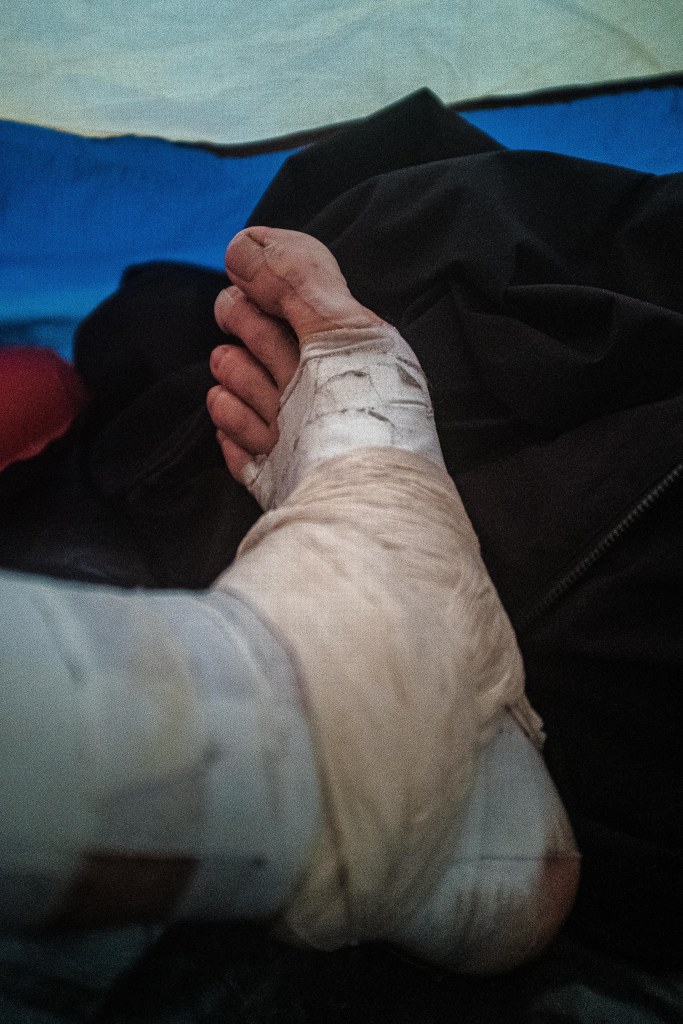
Day 5.
We start the day with a quick breakfast. We’re also told we can pay for a boat ride across the lake. We decide, given the circumstances (mutual exhaustion and my sore ankle), it’s the best thing to do.


Pontus is keen to get home and stream one of his favourite shows while in his newly renovated tub and washroom.
I want to stop walking for two days in a row. I am legitemately worried that I might be doing some long term harm to my knee or ankle.
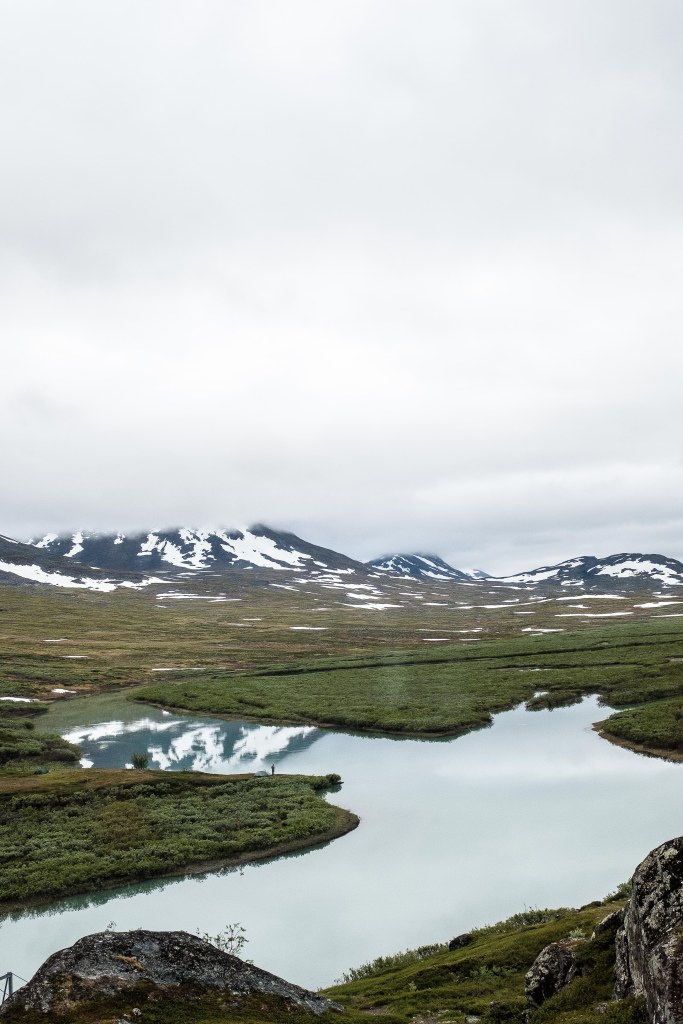
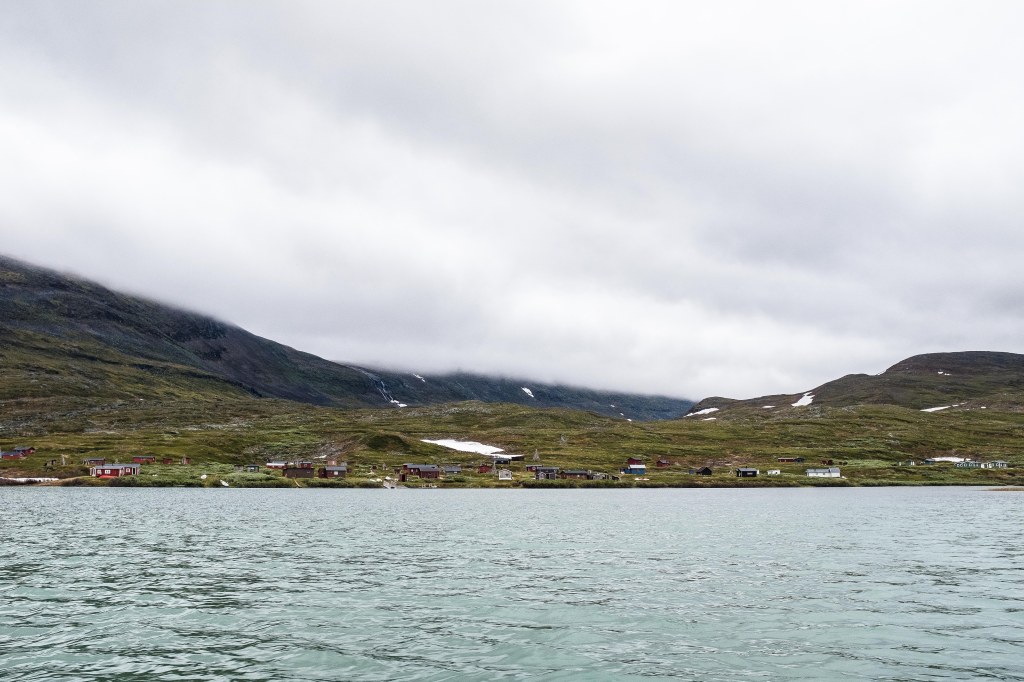
In order to get a boat we have to go down to the edge of the water before a certain time and raise a flag. We soon board a small fishing boat with two women, a mother and daugther. Our driver is a Sumi man. He speaks in Swedish as he drives and Pontus translates. He mentions deer, tourist and The Facebook rock (Where all the children go to get a signal for their data).
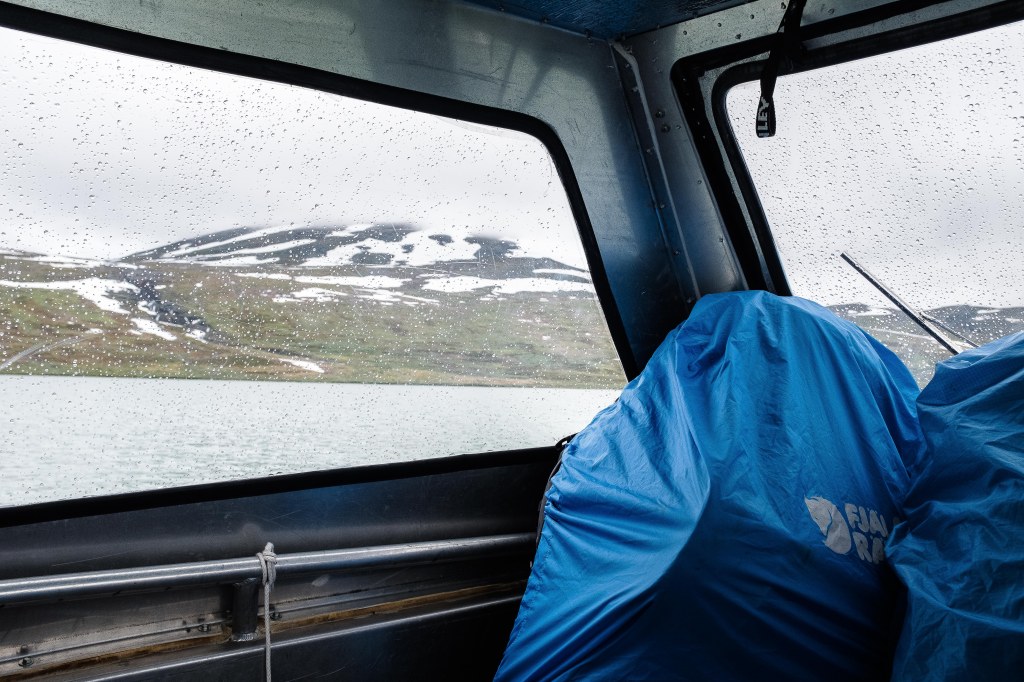
He is trusting. We can pay in cash or by swish, though none of us have an internet connection. He writes down our name and person number, he says there’s no rush. Sweden has become a newer cashless society and so he’s neither surprised nor disappointed.
We disembark the boat and encounter, once again, the Young Swedes. We laugh. They left early in the morning to try and get the hike done quicker. They look exhausted but so do we. I thank him again for the chewing gum and we part ways.
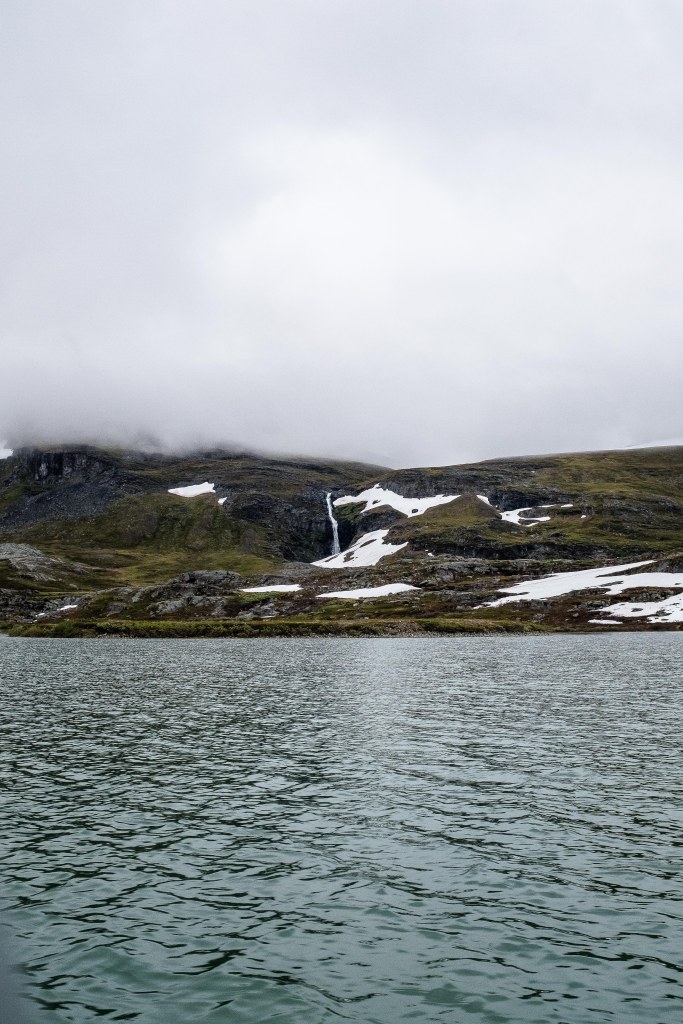
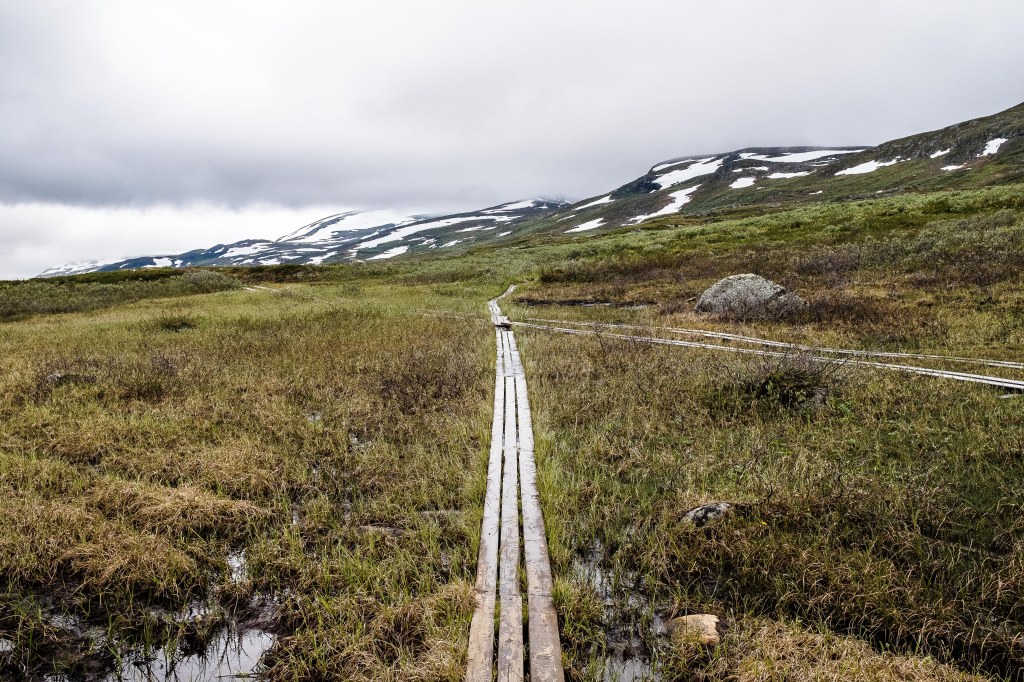
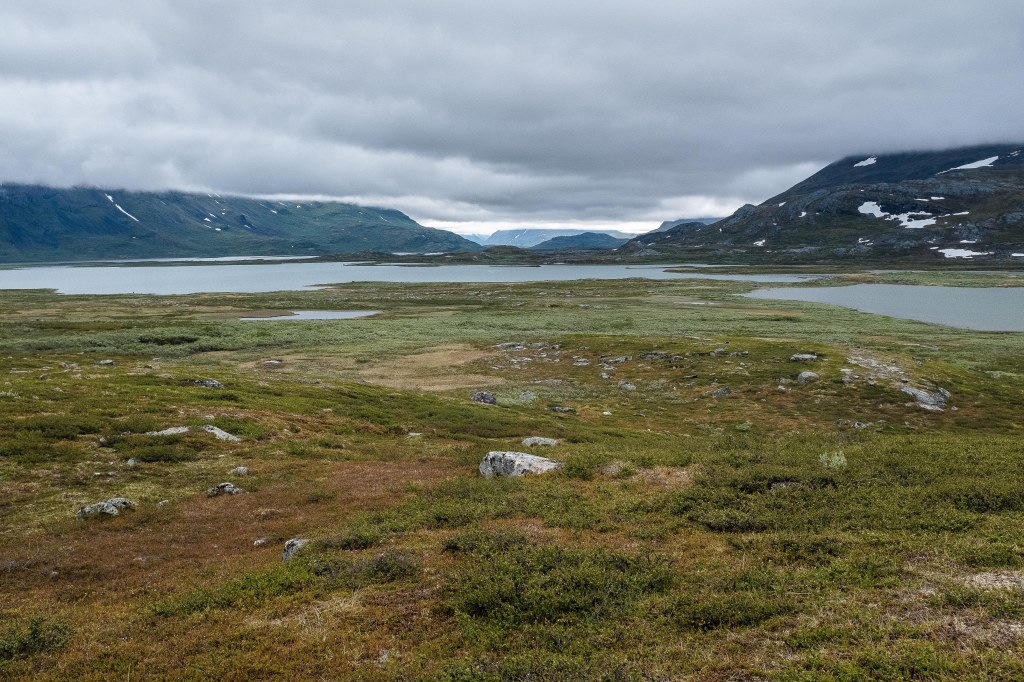
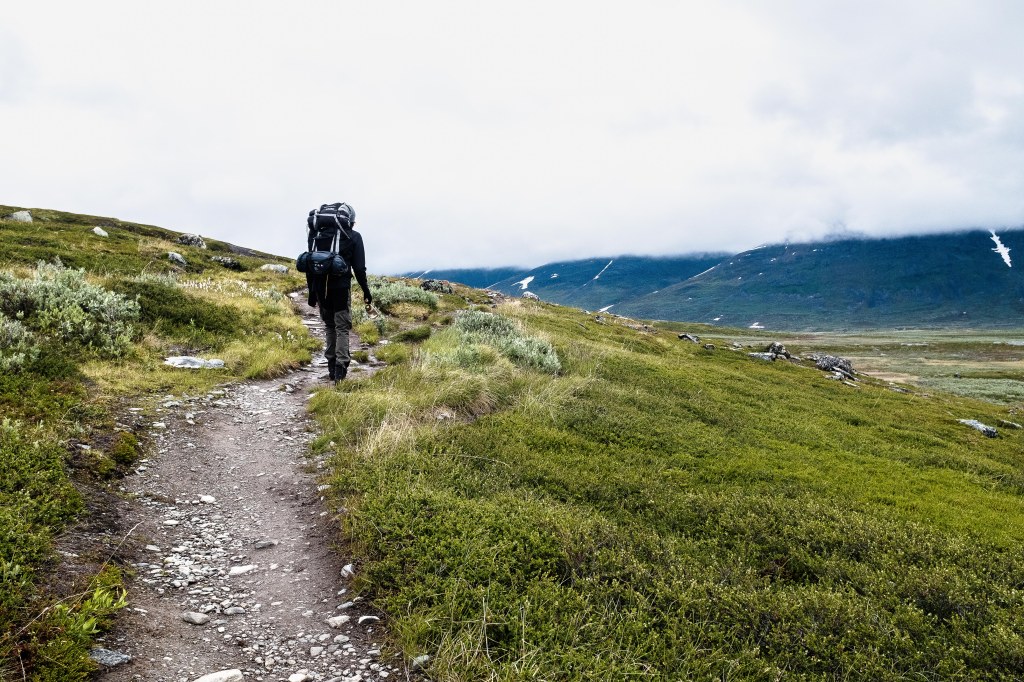
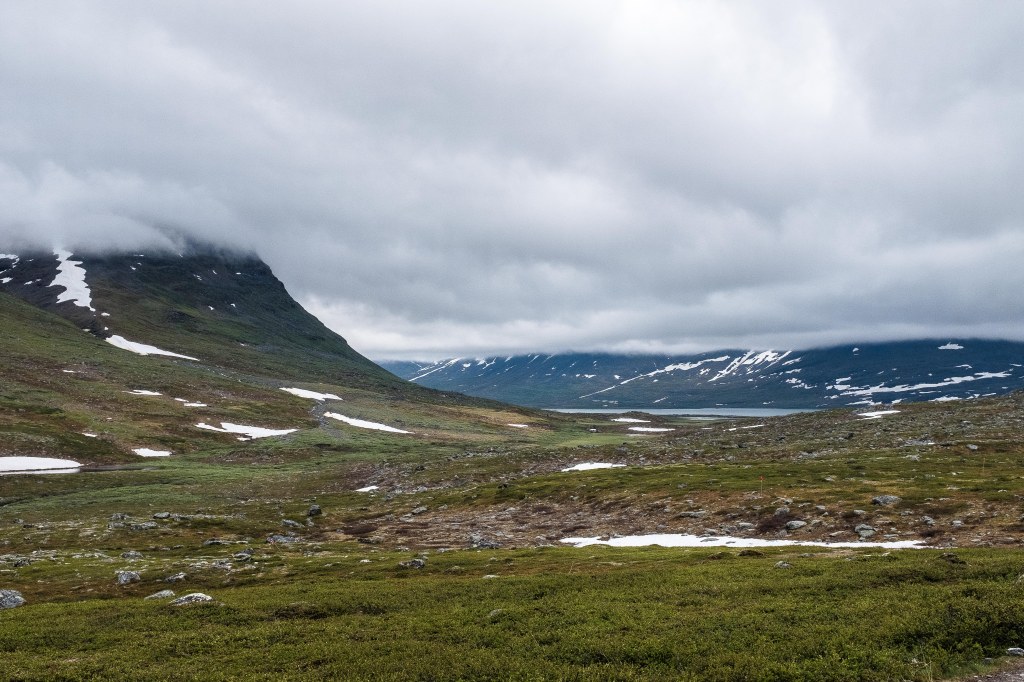

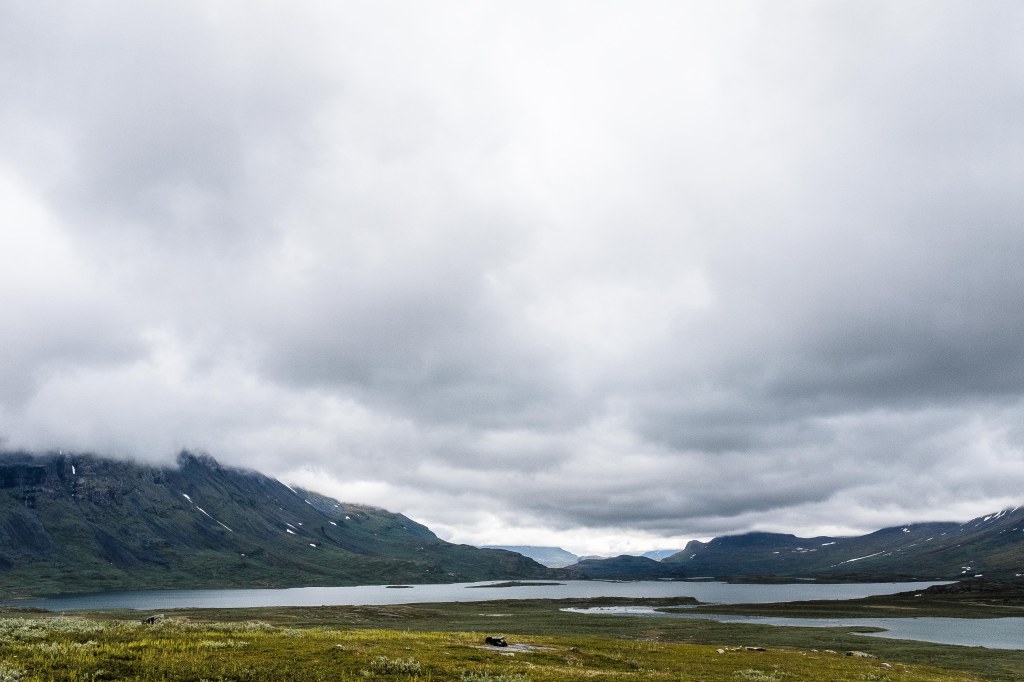
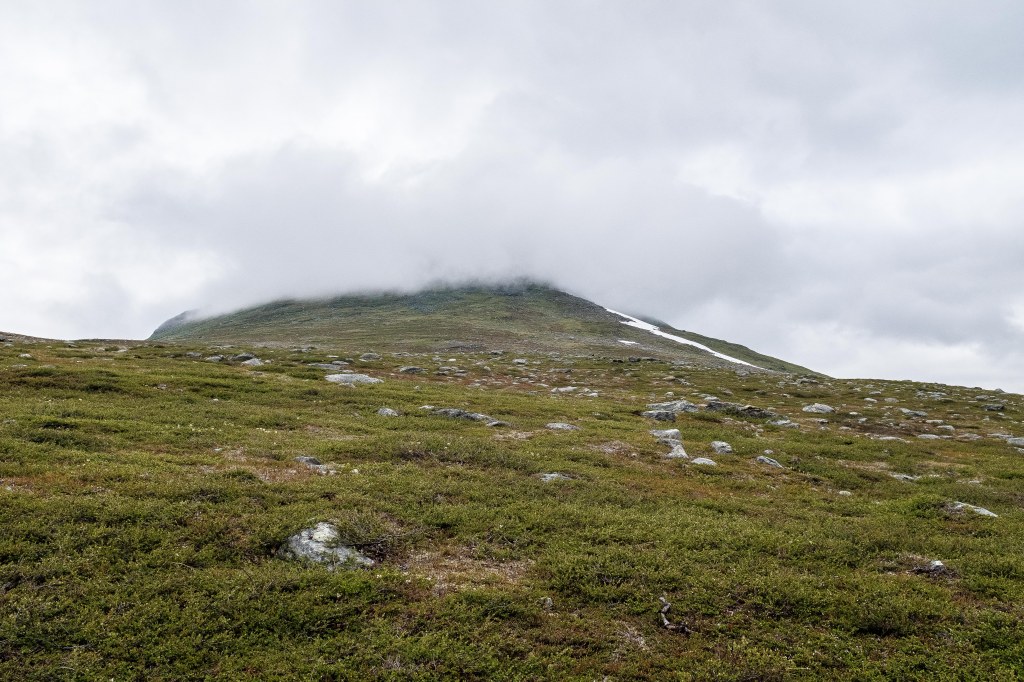
We are entering a new space. the grass is longer. The sky is perpetually covered in clouds. The temperature is not uncomfortable but it is cold and you can feel the water in the air. It is a threatening dampness. It’s hard to feel dry and we have to be careful where we choose to sit.


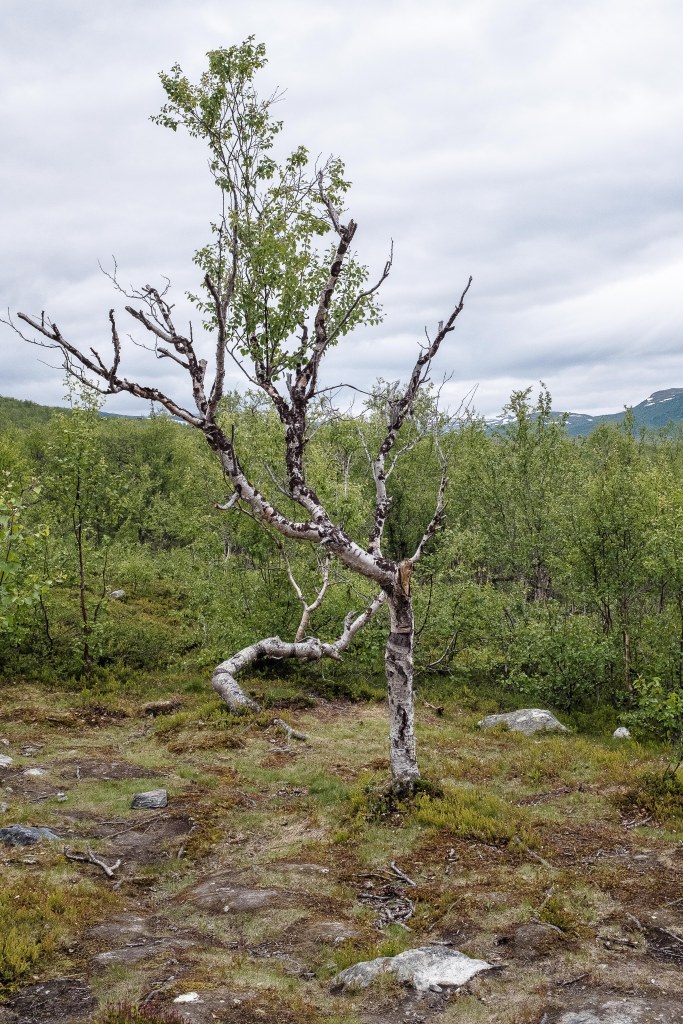
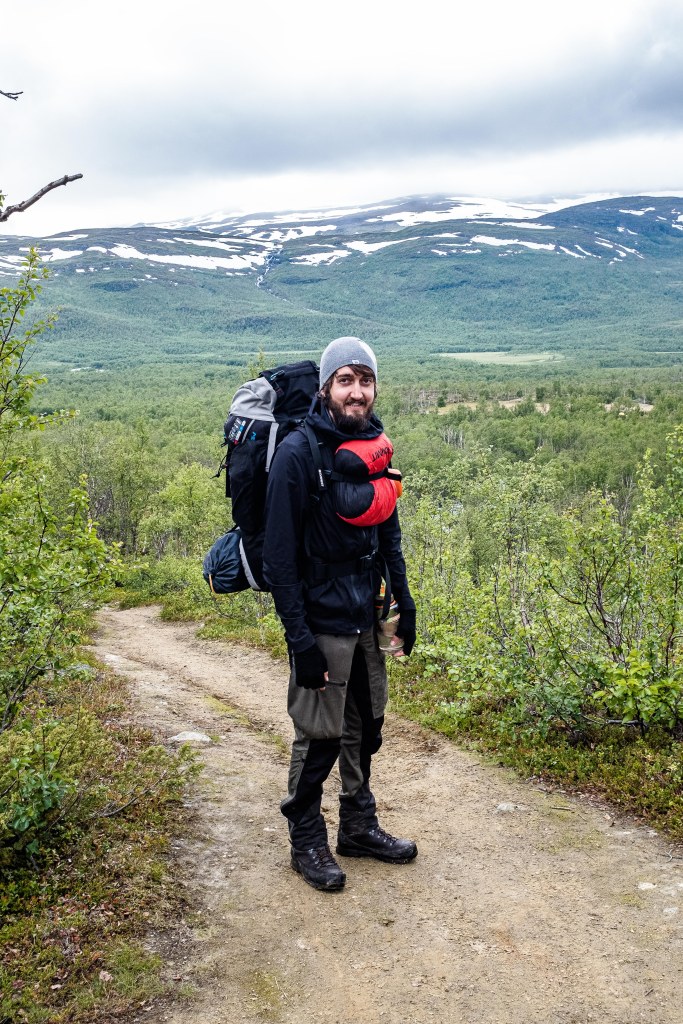

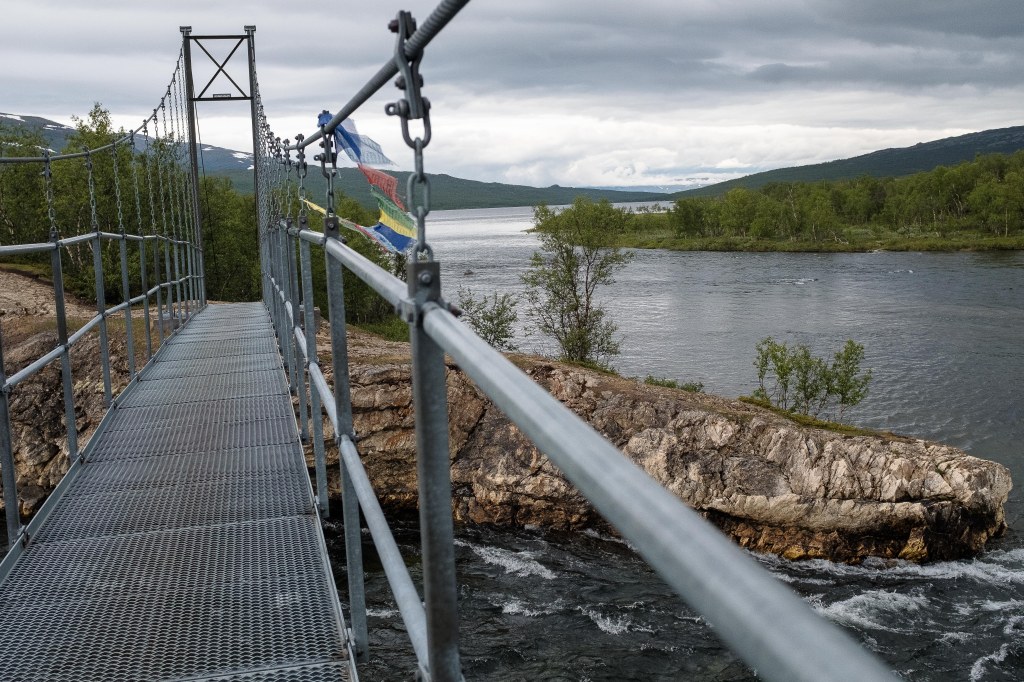
We buy some beer and sit down for food. We’re a full day ahead. Pontus wants to move forward. I think it might be nice to stay here and rest. He is anxious to finish. I ask about the train tickets. He says we can probably re-book. Sj has free cancellations / rebookings because of covid. We decide to move on but make a deal that if my knee gets bad we have to stop and set up the tent. Slow and Steady. We’re ahead of schedule and every step forward is not a necessity today, it’s a bonus.
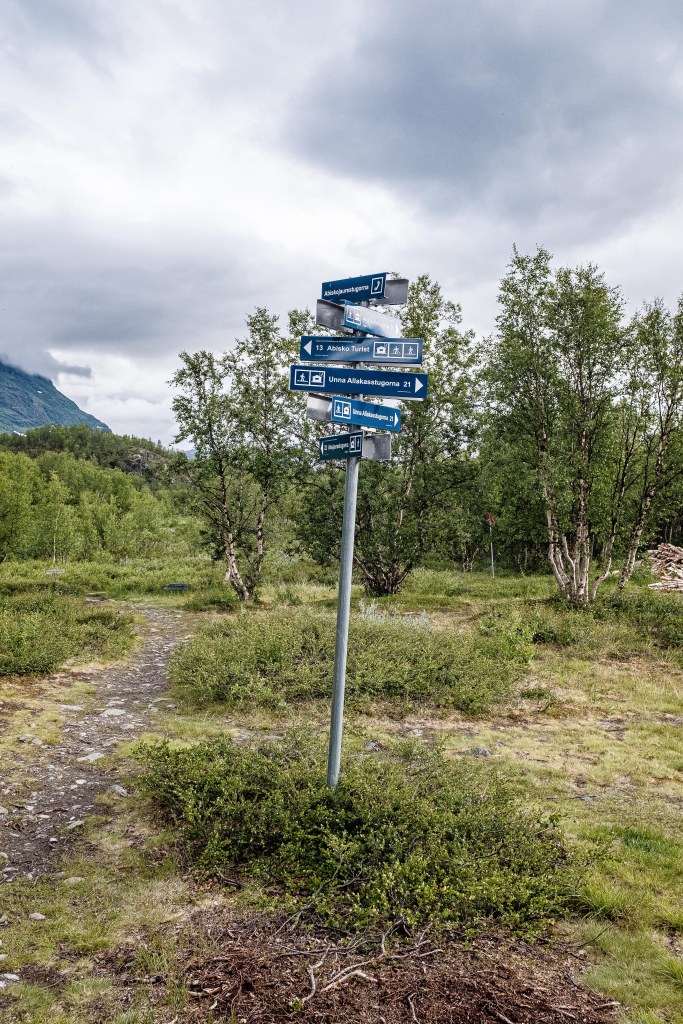

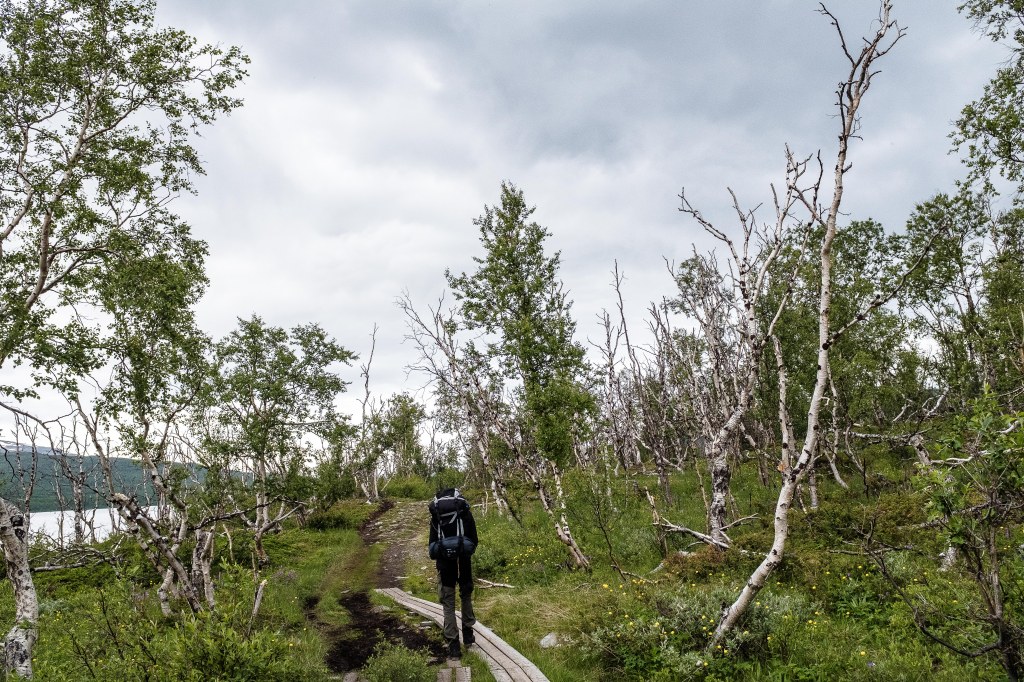
Trees.

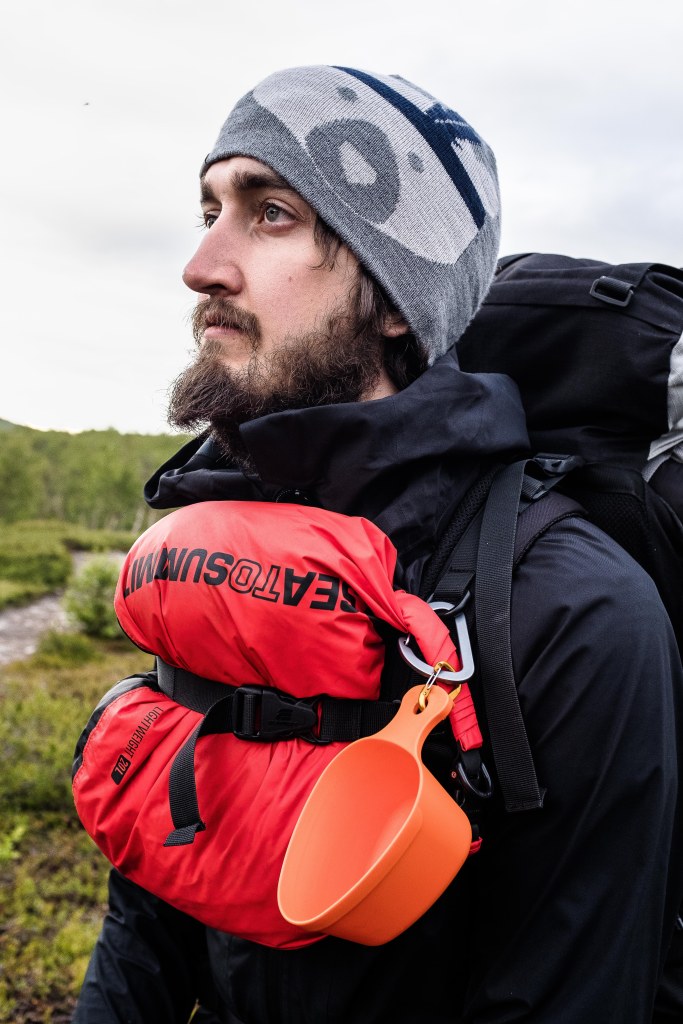
Lesson: Pontus borrowed his mom’s hiking bag and it was only through trial and error that he realized the chest straps were made for a woman or at least someone with breasts or a large protruding chest. These straps at first seem unnecessary but the longer we walked the more we realized they help keep things balanced and in check. Pontus started by using his hand in a sort of karate chop pose to apply consistent pressure on the straps. He eventually moved to a waterproof bag and, if memory serves correct, kept his dirty clothes in there make it thicker. The longer we hiked, the more padding he had, the more stable the bag…
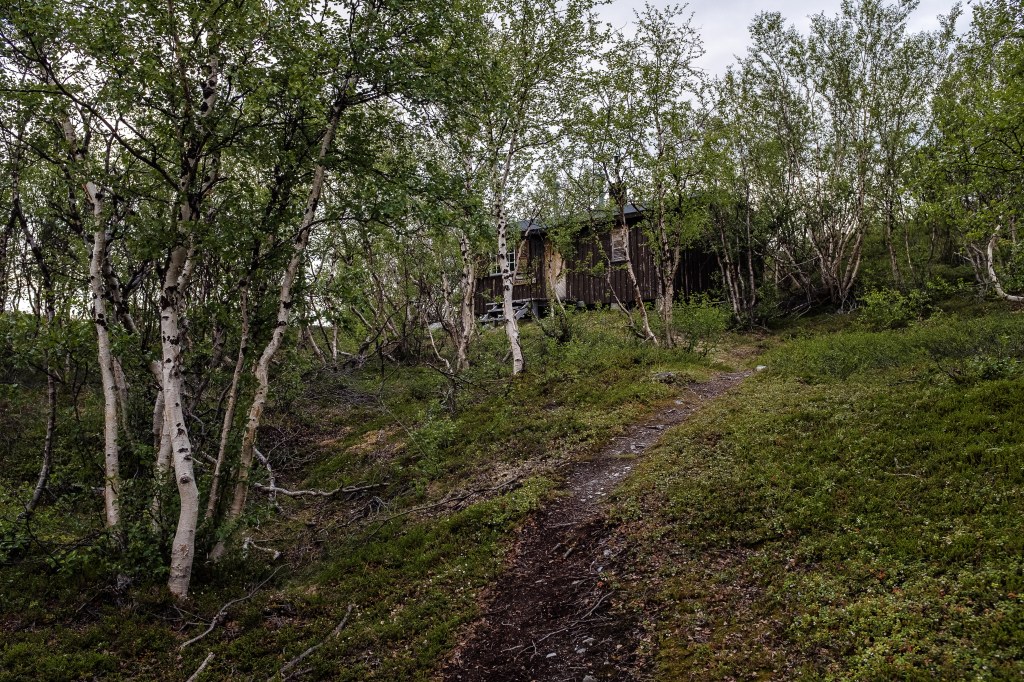
We see lots of trees and the area around us is denser then it’s been for days. We cross another bridge and there’s this beautiful sound of rushing water. We notice the remains of a fire pit. I want to stop here but Pontus thinks we’re close and wants to move forward.
It’s becoming harder to find flat ground but I give in and we walk for another half hour with no results. For the first time in the trip, we decide to move backwards. I remind him about the fact that we’re easily a day and a few hours ahead of schedule. He reluctantly agrees.
We set up by the fire and listen to some music. We go to sleep, exhausted.
Day 6
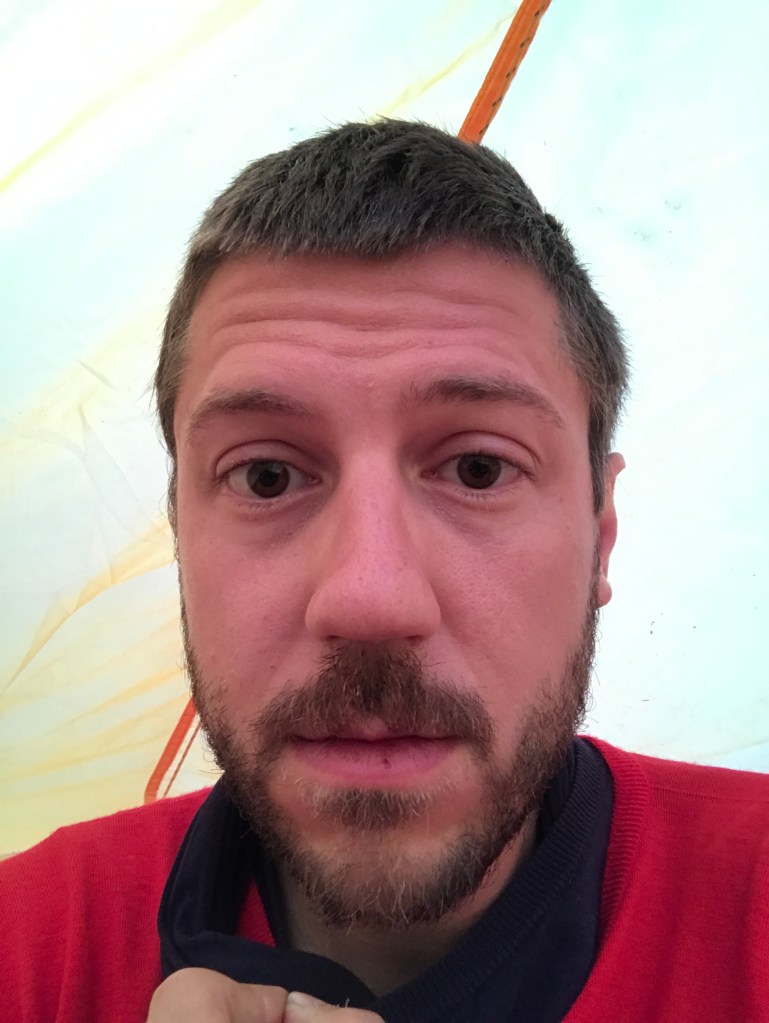
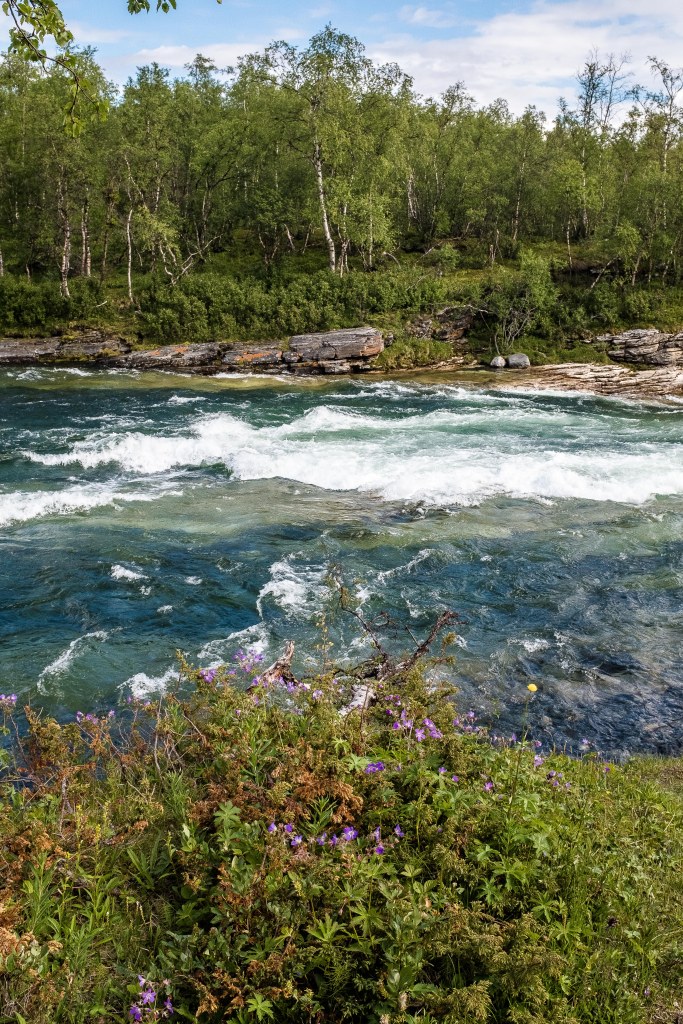
We hope this is our final morning. We wake up near the stream we settled by. The previous day was a hard one. My ankle is getting worse and I walk less like a human and more like the toys of old made of wood, threaded and bound up with string. I swing my leg forward, wobbling like the GI Joes in Toy Story.
We speak sparingly. We grab some water from the stream and head out. I am limping. I am sore. I am tired. I walk. Mostly behind Pontus. We know we are close. We see a campsite under construction. We are closer to civilization than we thought. Or so it at first appears.
There is a newly built bridge. Waterfalls and rivers. I take few photos.
I am tired of photography.
I am tired of walking.
We see an assortment of trees, an opening, a road and finally The Hotel.
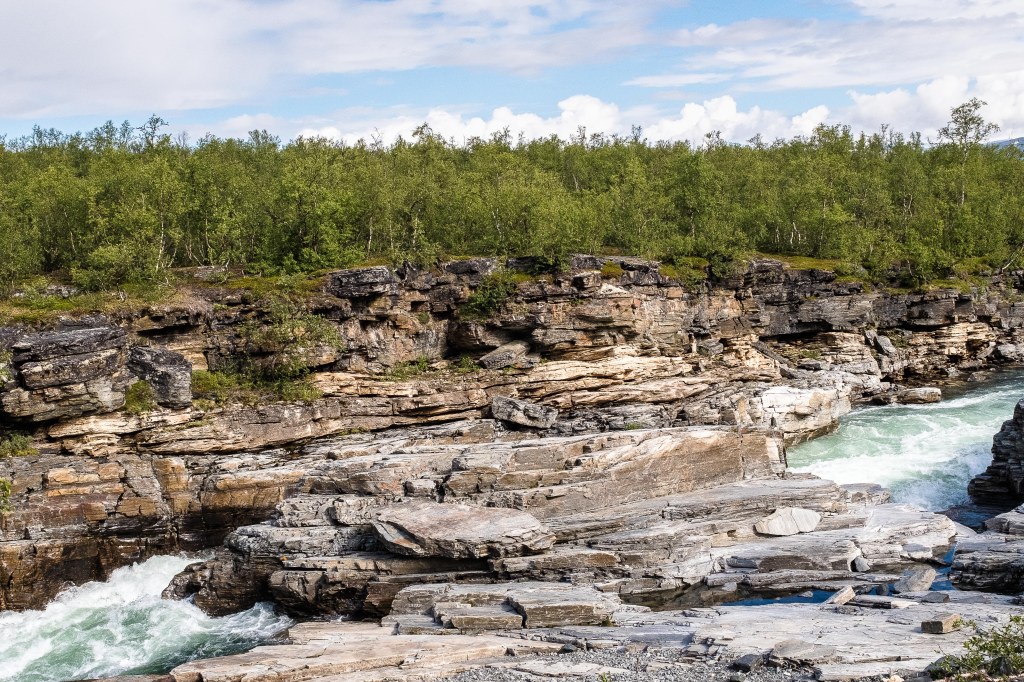
We are starving and the final hour, as the signs tell us we are getting nearer moves painfully slow. We start talking about the food and that it’s suppose to be a fancy restaurant. Something I usually avoid but that I’ll happily buy into if it means to Tikki Masala. Pontus jokes that, that’ll probably be what they are serving.
I curse him.
When we enter the hotel, I spot a comfy chair and lean into it and then fall in.
We are surrounded by an assortment of travellers. Those finishing up and those starting. This has been a good year for hiking gear. It’s clear that many of us, Pontus and I included, have only recently decided to tackle the outdoors.
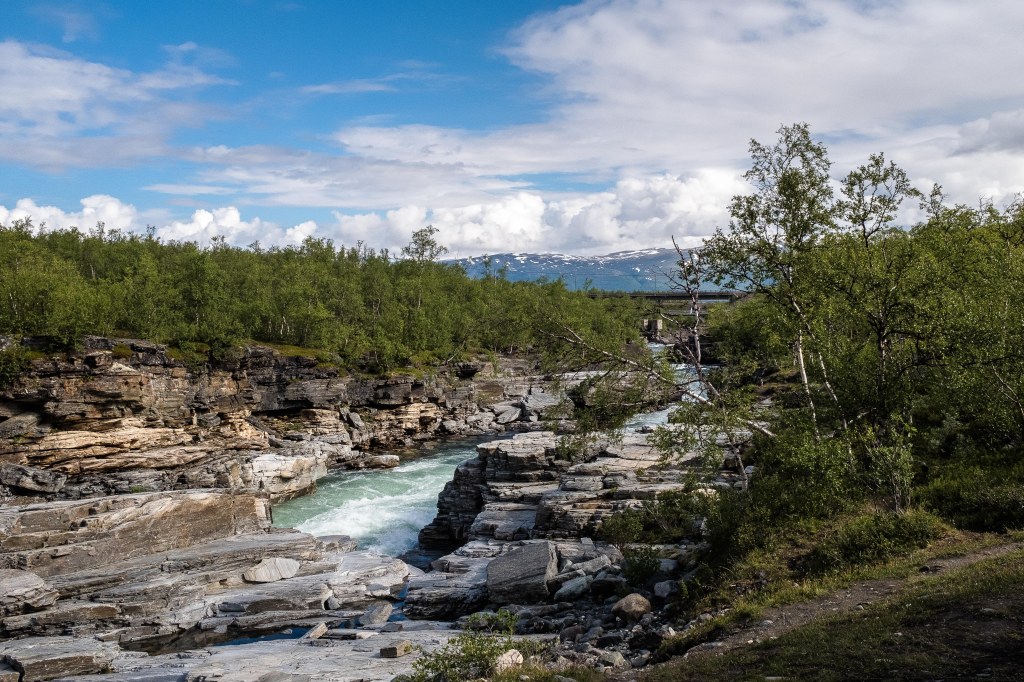

I get up and walk towards the menu. The restaurant isn’t open yet but the weekly lunch options are on display.
Pontus jokes again they’re probably serving Tikki Masala. I give him a death stare.
I ask him what day of the week it is and sure enough… It is Tikki Masala.
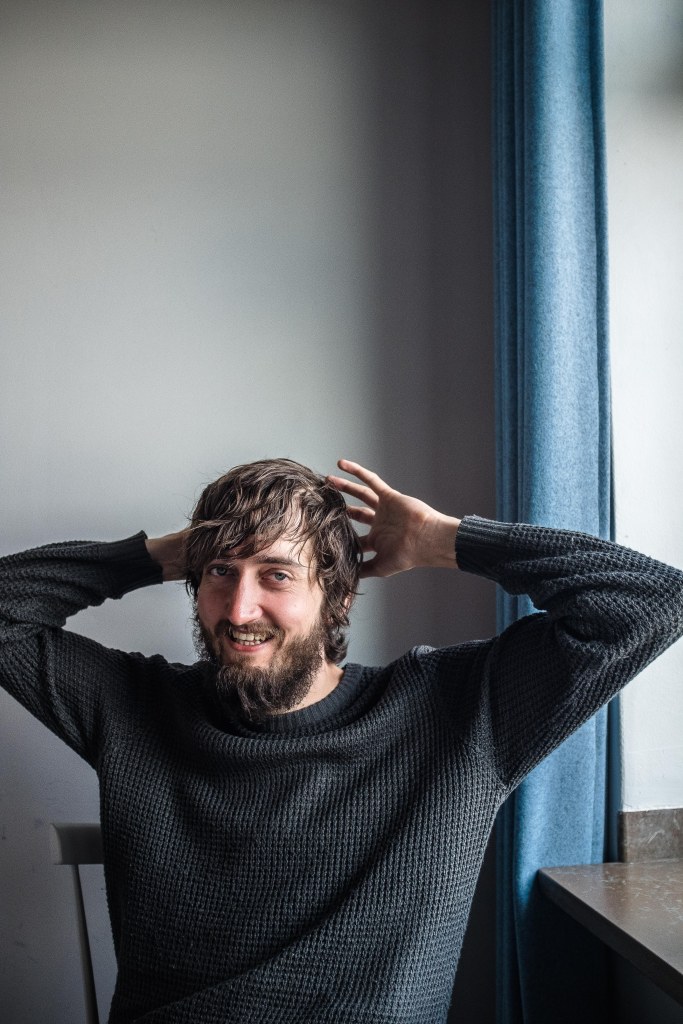

The restaurant is open but lunch isn’t out yet. We order a coffee and chat about the trip. He finds a new booking for the train ride home. We eat, commenting on how good it is to have warm food in a dry place and then make our way to the station.

Looking back, as is so often the case, it seems easy to find meaning or significance in an event after the fact. We started planning this trip at the very start of the covid outbreak and we started the hike when, in other parts of the world, lockdowns were already under way.
For weeks, it seems, the planning was something useful. Something deceptively simple that could put our mind at rest. Googling for objects neither of us had prior experience with, light tents, waterproof jackets or pants. Finding the right boots, well aware, due to Sarah, that Doc Martins simply wouldn’t cut it. She was right.
Throughout the trip, our mantras included ‘I’m So fucking tired’, ‘Old Man Sounds/Noises’, ‘I can’t wait to have a cold beer’, ‘We’re nearly there’, ‘Isn’t this beautiful’ ‘Slow & steady’….
On the way back we are exhausted. Yes, we have been able to book an earlier trip home but the wait is excruciating.
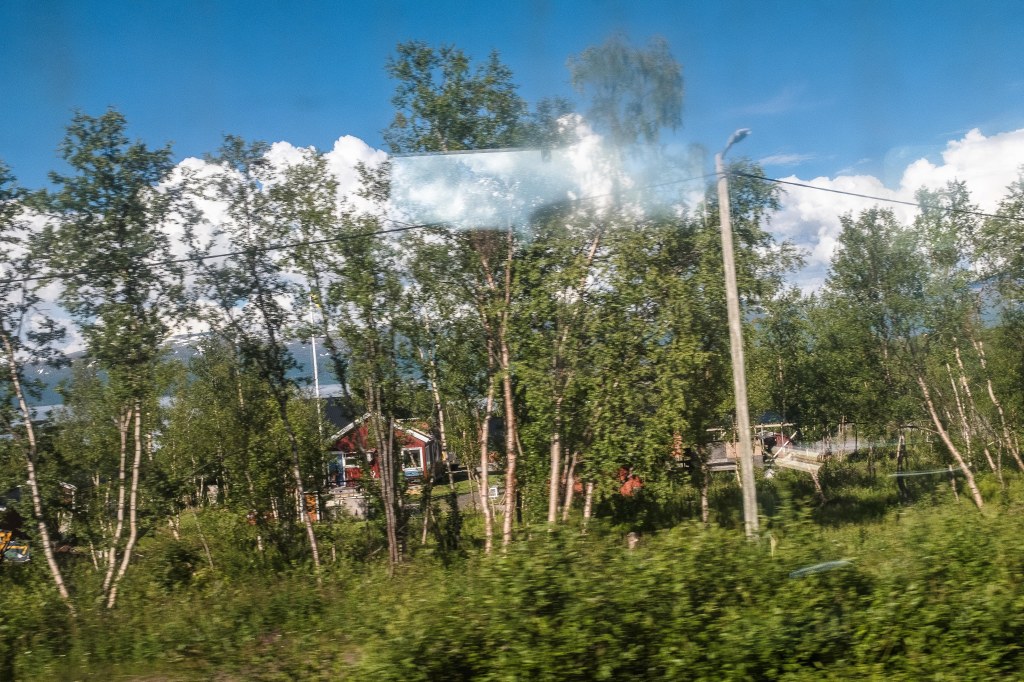
When we do finally board the train we are again joined by a third. This one smells of shit. Literal feces. He tells us he got the runs on the trip from some bad water. Possibly the same streams we have been drinking from, unfiltered. He mentions a few years ago he went with friends, and, much like us, he felt he’d rushed the trip. He’d promised himself he’d come back solo and the covid outbreak made it possible. When he’d started walking, he met an older German man and they’d walked together for over a day and then went their separate ways.

Later on, when he was sick, this same man gave him pills to help with whatever bug he caught. He rested for two days at a camp and then made it to the train.
He looks exhausted. At the time, I wonder why he’d want to do the trip alone. These days, I feel I understand the drive a little bit more…
As for this writing, it feels almost inappropriate to write about a life changing event when the understanding and significance of that event continues to change after the fact.
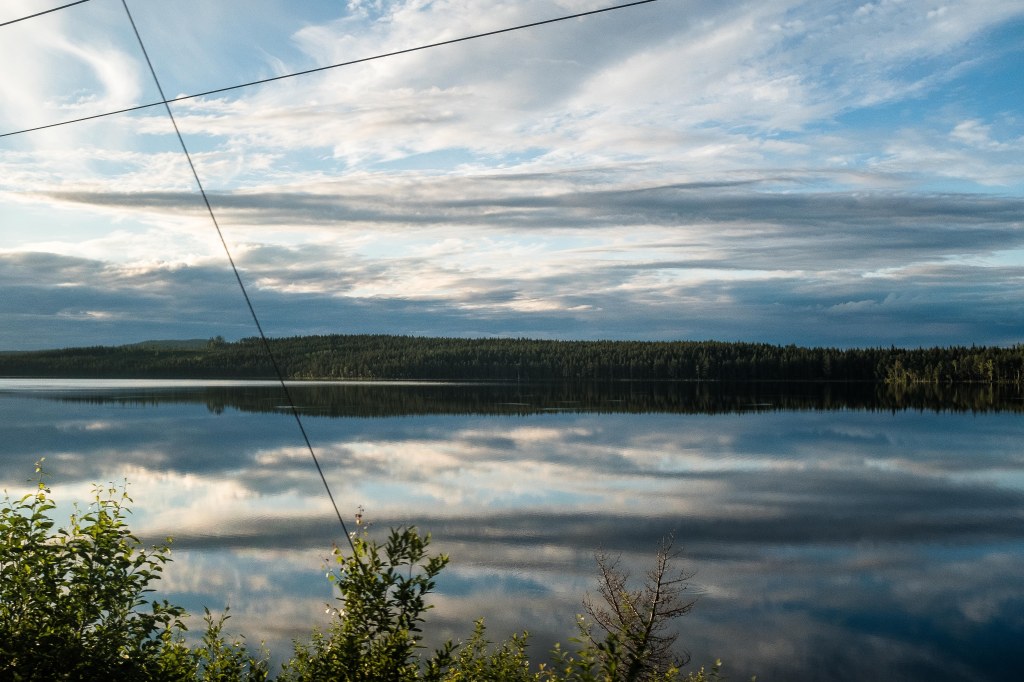
Whatever this is, a diary entry or a non-fiction account of a hike, a nostalgic take on low-key climbing or simply a series of thoughts, the writing process has been much like that of waking out of a dream with the remembrance of a feeling but no real understanding of the content. The writing was initially taken with no reference to the photographs or notes, the events reshuffled, primarily the encounter with the Swedes happening in an earlier cabin than memory recalled and then the text filled up as the images were added.
As time unravels, what was once, remains much the same, only it now consists of a series of immaterial weavings. The strands of this trip, of these memories, are not unlike those found on an ancient and worn front door carpet. This carpet, whose shape and texture has, over the years, evolved and permanently absorbed debris, is no longer as it first was. However, in its current and ever changing shape, it is undoubtedly that much richer as a result. Though its former is self no longer really recognizeable, it is certainly more unique in texture and history than it ever was, when first displayed in memory’s window…
The List:
Shared goods:
Coffee Filter, Coffee, Speaker, Phone Charger
Deck of cards, Mosquito Destoryer, Knife, Paper / pen, Compass
Map, Freezer bags, Garbage bags, Cloth tape
Cleaning sponge, Dish soap tube, Dish soap bottle
Washing powder, Soap, Suncream, Ipren
Voltaren salve, Elastic bandage / arm sling, Plaster, Hydrocortisone
Lock, Lighter, Alcohol gel, Trangia kitchen, Fuel for kitchen, Matches (any weather)
Personal:
Clothing: Thin wool sweater, Thick wool sweater
Underpants, Thin socks, Thick socks, Long Johns, Undergarments Top, Shirt, Gloves, Buff, Hat / cap, Raincoat, Rain Pants, Hiking Pants, Sandals,
Boots, Shorts, Toothpaste, Towel, Tights
Backpack, Sleeping bag, Tent, Water bottle, Sleeping matress, Seating surface, Mug
Spork, Food bowl, Pack liner, Sunglasses, Mosquito repellent, Mosquito net, Phone, Toilet paper, Toothbrush, Hygiene products, Blister Cushions, Blister Patch, Cash, Debit Card, Book (Walden)
Extras:
Dried fruit / berries, Nuts / sunflower seeds, Energy bars, “Jägarsnus”, Cakes / buns, Alcohol, Tobacco
Thank you Justin! You have made a great job and it was fantastic to read about your trip and to see all the photos.
/Pontus mum
LikeLike